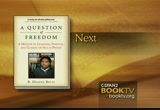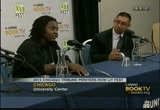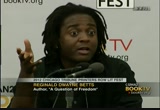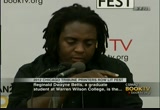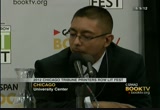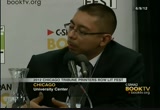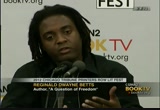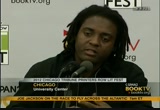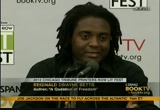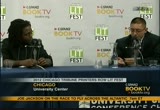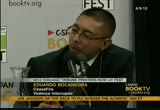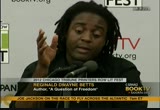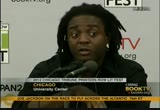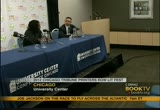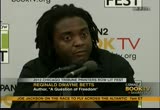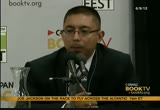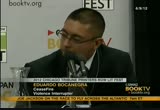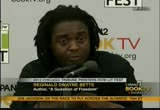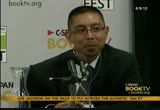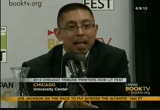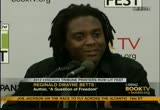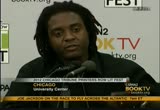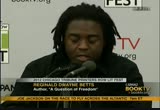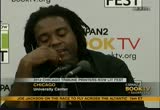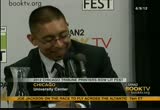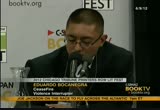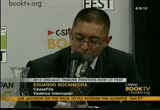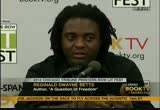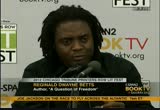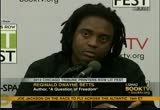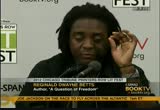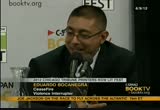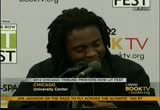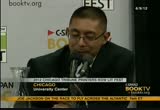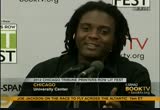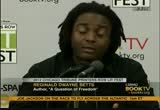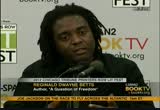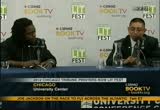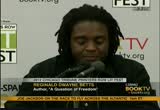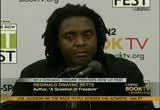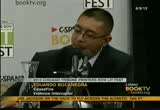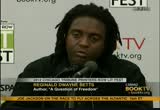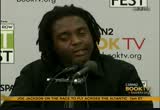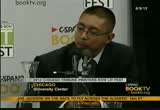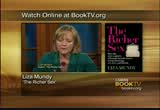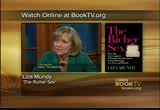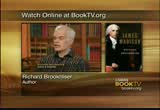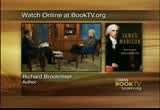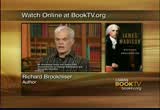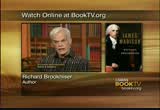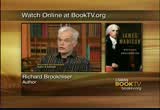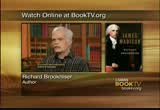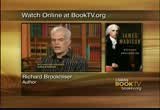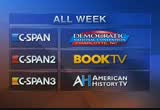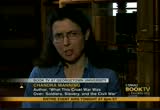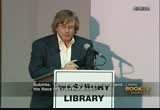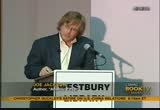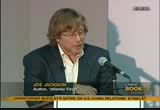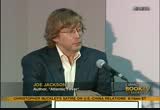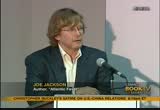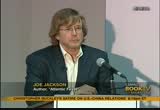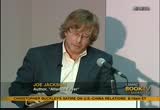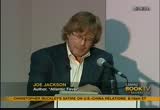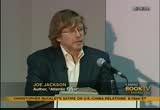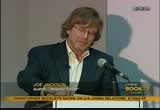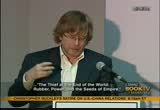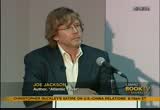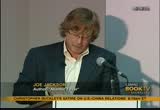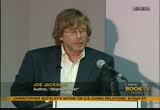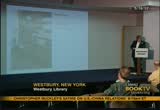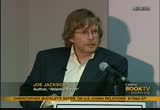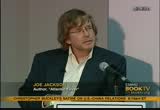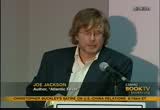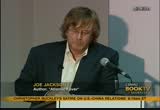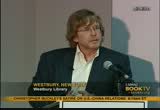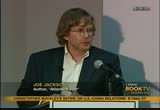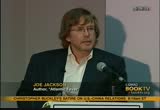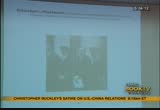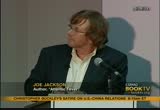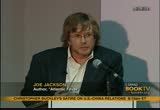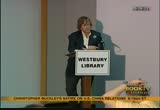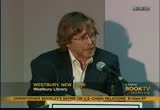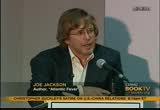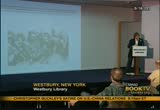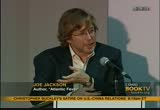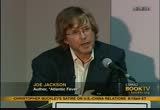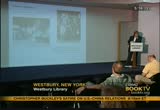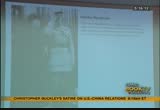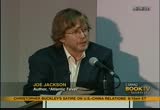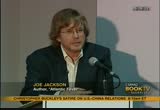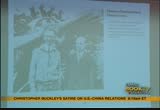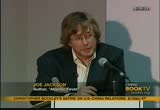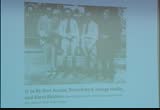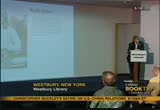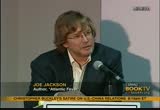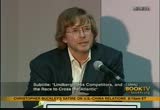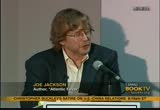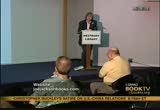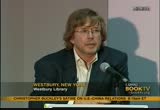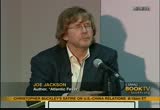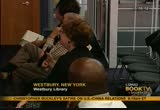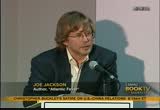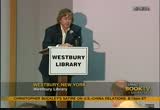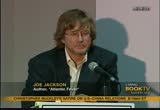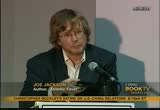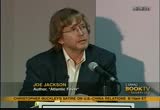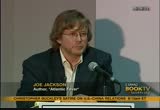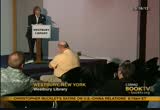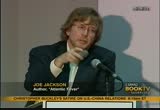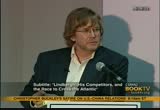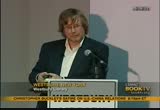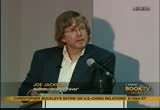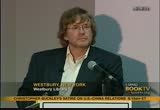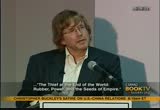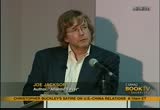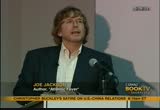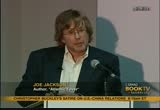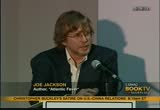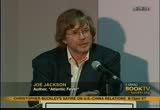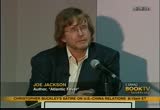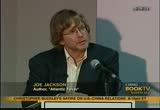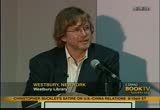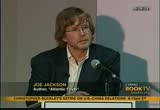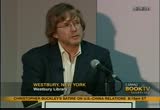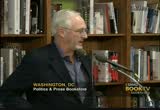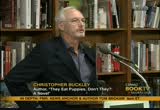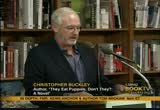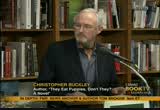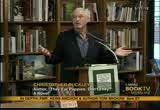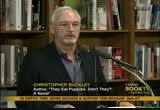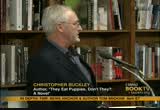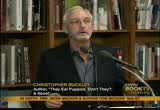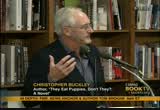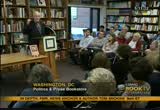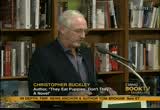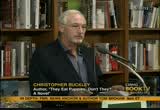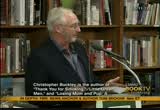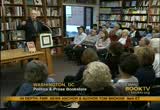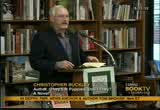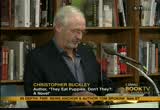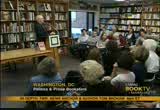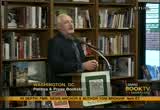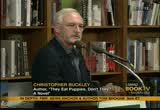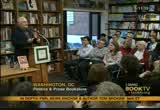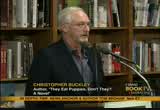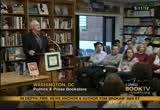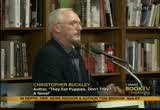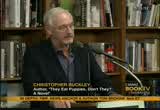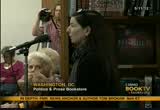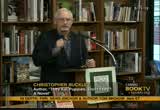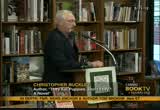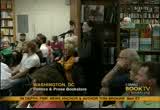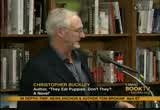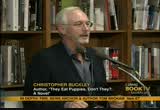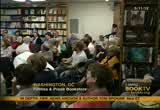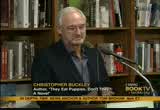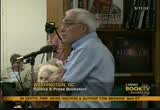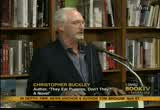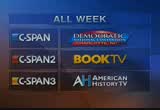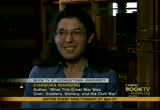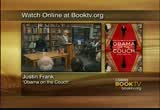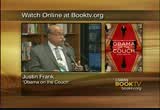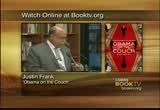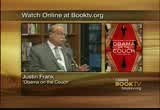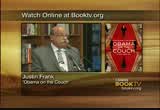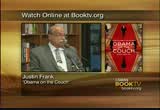tv Today in Washington CSPAN September 6, 2012 6:00am-9:00am EDT
6:00 am
eduardo bocanegra. let me you this question to start off. i know, you mentioned your name several times throughout the book. what would you like to be called? >> duane is fine. >> it's nice to enter view something like you. i read your book. there's a ton of stories in there about your life and the way you arctic late and the way you describe some of the scene what you went through. and i guess one of the questions i wanted to start off by asking, what motivated you to write the your book? >> so two things just in case somebody in the audience doesn't know why i'm -- my name is reginald dwayne betts and at the start of it.
6:01 am
i'm named after my father, but everybody calls me dwayne. aisle get into why they called me that in prison. i was incarcerated far carjacking. i did eight and a half years in prison. and your question was, what motivated me to write my book. what makes your book different from any other books out there about prison and inmates. >> the interesting thing i was i had been arrested when i was 16. never committed a crime. i had a gun, it was my first time ever having a done. you know how you hear the stories in the first time somebody did x for the first time and you don't believe it. i didn't believe my own story. i knew i could have committed a crime of this nature. it was the only crime i ever
6:02 am
committed. then i thought how do you explain it to yourself but how would i go about explaining it to my mom and the rest of my family. and particularly, in light of the fact that i had been a reader before i had been incarcerated. i had read books about prison and people like i've never heard of. and also, i had just thought of incarceration and what it meant to the black community before committing my crime. and so, i decided i wanted to be a writer while i was in prison. and part of of the impulse was to write as means of finding an explanation to my own. when i got the opportunity to write the book, that was the main reason why i wanted to write the book, also, you know what i found different is every book that i can name and think of about prison, sort of has the natural prisoner's life.
6:03 am
it's typically before prison, during prison, and after prison. you get a good feeling about the person that committed the crime. they did something that is credible to to get to the place to write the book. if '02 you're feeling something good about --ic you stop think abouting when it means to be in prison and the justice system and what it means to the country. i wanted to write a book a that what it meant to be a juvenile in prison. and two, i wanted the book to essentially end with me just leaving prison, you had no idea what would happen to me. because i had no idea what would happen to me inspect in that way totally being a focus on my it could start a conversation the role of the justice system and the variation communities. >> one of the things you mentioned you were 16 when you caught your case, am i correct. >> 16 years old. juvenile.
6:04 am
and it would have been charged a adult life sentence. something that i believe took from your book and even hearing you now and my conversation that we had the other day. you have policies that affect juveniles and affect adults and the policy makers are not necessarily people like you or myself. say that because, again, being in the same -- walk in the same shoes you walk in the past, you know, i could relate to a lot of stuff that i read. my point is that often, the stories that i shared by a lot of people that have been in the prison system are not necessarily echoed in a positive way. what you've done, you know, taken this native experience of going to prison, but also, you know, you took ownership of what happened, you know. you never really denied the
6:05 am
stuff. you did explain they arely about what lead to it and what you did with your time there. you see the struggles, despairty, how population are march losed. i wonder now after you wrote the book, what's become of all that? >> well,, i mean, i guess i could say that one of the things of the book was giving me the opportunity to go to different colleges to speak on different panels and actually to speak at congressional briefings about some of the policy issues they're going through in incarceration. i think about when i had been locked up at 16 my mom didn't know 16-year-olds could be tried as adults. i had a cousin than got locked up. what happened is what i wanted to do is start a conversation in the community how do you prevent
6:06 am
crime and prevent what's going on what happens to the young people who make terrible mistakes. put it perspective the judge sentenced me he's under no illusion in prison. i was sentenced to nine years. even if i did the time. i'd be released at 25. the judge understand when i was sentenced but it was nothing in prison one said place to protect me if i needed protection. but given that, you know, i was barely old enough to get a drlings. and so some of the conversations that have now and trying to connect my experience to policy because i think it's one thing for me to talk about my experience. i think and some in ways that's important. i have funny stories. i haven't told any. i have a couple of funny stories about what it means to be in prison. and it's something to be said about experience you know what it means to go do something
6:07 am
different and there's something relevant to be said about that. i appreciate the idea of a memoir. but i think it's something to be said about policy in looking at my experience. there haven't been many i can name or maybe the national prominence that had the opportunity to connect their troubles to larger policy issues. and i want in time to be able to do that and be able to in some ways distinguish my -- disconnect my troubles from the policy issues. i haven't been able to do that. but at the time i want to be able to do that. the reality i think the experience i have makes me able to discussion some things in a way and with nuance to somebody else may not. sometimes it's hard for people to hear that. they always connect what i say to my trouble. they don't hear somebody who could be a expert on policy issues. they may here a 16-year-old. they say i had a baby face.
6:08 am
i don't know. i'm absolutely certain that i'm no longer 16 years old. there has to be a place where you ask to be a part of a discussion they can be a part of a discussion based on the skills they earned to contribute. and i just wayed on the troubles that they dealt with. >> all right. you know, it's interesting enough to -- based on the conversation that we had the other day, we're talking about some of the challenges that we've had with some of the success, right, a lot of times people this it happens overnight. sometimes people think that there's more to what they're seeing. there's more behind the curtain. and truth of the matter, you know, obviously i've seen how nationally you've involved in this discussions and even as a consult assistant and through a lot of work not with the community but -- [inaudible] interestingly enough, had i had
6:09 am
the honor to be the main subjects in the documentary. i talked about it. when i introduced myself. i told you, well, i have this privilege of being part of the documentary. i saw that film last month. i was like, yeah, that's me. but i didn't say it. because i thought he was the -- [inaudible conversations] i was like eddie. he's like that wasn't me. i was like, good. working with the kids painting and stuff like that but we were joking about that. but, you know, it's amazing because no matter how much we struggle, and how much we think, you know, we done good and how much we've tried to change our lives. there are critics and skeptics and my question is, i've had my challenges, you know, but how has it affected you as far as people -- how do they see you
6:10 am
now and, i mean, when they look at you really giving someone who is could arctic late when they speak for those who don't have a voice. >> yeah, you know. well, the idea of speaking of for people who don't have a voice. i just kind of don't like that term, i think it's not true. i think people have voices. i remember when i was locked up. we were talking about a kid i knew -- he must have been second cell partner in prison. and we were both 16. and, you know, the thing that devastated me, he was 16 he had a picture of his daughter. his daughter had been born right before he was born. he had been arrested for attempted capital murder. it's a long story, to be clear
6:11 am
in the incident the gun was never fired. he claimed that he didn't pull the trigger. but he was sentenced to 63 years. i think to myself, you know, how can do 85% of 63 years at 15 16 years old. that's a life sentence. i remember writing the aclu about his case. i thought to myself that a lot of people write letters to variouses orings. when we say people don't have a voice, i think a more accurate statement might be that people have voice that we don't often listen to. and i mean i guess i do i try to represent. this is on c-span. i know, people who have cable who have five inch color tvs and sitting in a cell somewhere. i used to watch c-span. right now at the very moment, there are people that i know who could be watching this on c-span and so, when we talk about
6:12 am
people not having a voice, people have voices and people have voices in ways you don't expect. i don't know how i appreciated c-span giving me the opportunity to listen to authors speak while i was in prison. now that i know people could be seeing me speak and what it means. i do understand it. there are occasions when i do get an opportunity i do get to speak for people who don't get to speak for themselves in larger context. i don't people doubt that. what they doubt anything -- this is like watching the interpreters. i thought i had two children, a wife, bills and i thought when we do this criminal justice reform work and we try to stop violence, how do we have a conversation that goes beyond stopping violence and goes for life building. and i think, that's something that people don't necessarily want in the past have wanted to
6:13 am
engage me with. i haven't had many conversations with people within the community that went beyond me speaking about my experience in prison toward how do i make a life for myself in the free world. and if i'm devoting and i met young people who devoted a lot of their time to speaking at hears or local or state hearings speaking at community centers talk about their experience trying to change policies. and i've often felt, okay, i'm glad you're doing the work. what work are you doing to be able to put food on your table? and to be able to sustain you you can build a different life for yourself. at the end of the day, there is a problem -- i committed a crime. the end of the day, i have to figure out how to address the fact that it might be a young kid like me on the verge of committing a crime. how do i convince them of the important work that has gone toward me building a life for
6:14 am
myself that is in a lot of ways independent of me having opportunity for speak for others. and speak for myself. and, you know, that's the work that -- that's the work that citizens actually value most, you know, how much citizens and the people of the world truly value somebody who talks. you have to be able to do more than talk. i know, people really, really value what it means to put yourself in any circumstance and try to get a nine to five and pay the bills. at the end of the day, one of the things i imagine that drives resit vifm is the inability to get the nine to five. the inability to see yourself as a working citizens and only sort of being able to concept lose yourself as a former inmate our, you know, whatever. >> i agree with. i agree. something that kind of resonated with me, the last conversation about, you know, people who
6:15 am
aren't proficient who shared testimony, talk about their experience both in prison and in the challenges they've had growing up and then, you know, change challenges they had coming out of prison being released. and so there a lot of agencies out there in the community organizations so forth that often, you know, we are testimony -- i told you my testimony, i would rather save that when i go to church. i didn't get to learn that until recently. and i'm 36 years old. i'm just realizing it. you call it a mascot. and i started cracking up like sometimes that's how people look at us sometimes. people with authority or people who have the ability to preach but here to help out communities. but they become -- and the values of the from the
6:16 am
organization. i say, i get it. i think, you know, i get it. it's difficult. it's difficult to -- one, i think just the reality. i met people who i would say, listen, it might not be the work for you. you probably should go back to school. i don't know why you think you have the right to sit at the table that spent ten years studying criminal justice policies and get the same respect and authority they get. maybe you should choose not to do this. and unfortunately felt the need to say that. the truth is that everybody in the audience is thinking, okay why should i listen to you. if all you have is your testimony. that may per said some people to listen. they're going to look at the question again and the testimony and lean toward the other person on the panel. again, i mean, i got out of prison, and i went to college first, i went to community college. and then i went to the university of maryland.
6:17 am
i -- one of my professors from the school said why didn't you mention our name. i went to the community college in maryland then i went to the university of maryland. it was a lot of work going school that didn't necessarily show up in my bio when i was introduced so some places to speak. but when i came it around and came around for me to apply to fellowships or jobs, it was that work that allowed me to extent myself beyond my testimony. it's not that i don't embrace my testimony, i mean i do embrace my testimony. it's just that, you know, at some point, you want people 20 respect you -- for what you've been through. when they say i don't know how i survived your life. and i think your life hasn't been that great either. [laughter] before we go back and forth to get some questions from the audience. i wish -- we should do that.
6:18 am
any questions from the audience? >> put them on the spot so that -- c-span things can at times -- we had maybe turn the channel. [laughter] so if you have to hear you laughing and make sure that you're enjoying it. if you have any questions, you all could -- if not, we have a lot of things to talk about. even if it's a comment. if you have a question, please come up to the mike and share it. >> yes? >> so you got my thinking, when you mentioned you had a handful of funny stories from prison. would it be too much to ask or share something with us. >> let me think of something that is funny. >> there aren't that many funny stories in prison. i just said that. man, do you have any other -- there are a things that i found
6:19 am
humorous. i think you were laughing. i was laughing because i was calling -- when i was in prison, i was like, i remember that. and there was some sad stories that you mentioned there were necessary funny our more, there was laughing about it because i was like wow. >> i don't have any funny stories. i thought i had funny stories and then i realized that i laughed at thing that aren't appropriate. so, you know, i will tell a story. i'll tale sad story. but it's like -- if i was it would be hilarious. so you're in prison and they are rules set up to sort of ensure your safety. and so we had lots to protect your equipment your snacks and your hygiene and cigarettes if you smoke. so people wouldn't steal from you, right. it wasn't effective at all.
6:20 am
it's like having a club when you're caught in a dangerous neighborhood. you don't have a club because you think it deyou have it because it makes you feel good. you being proactive. people have locks on their stuff and go in saw the locks and still take everything you own. that was sad. one day, so one someday coming from the reck yard and i was a little guy. the thing about prison, you get there and some people deal with mental illnesses that you don't know about. the little guy had cuts up and down his arm. a little white guy. prison is the one place in america which in being a white male is not to your advantage. [laughter] and which is a really sad state of affairs. but anyway so this guy, you know, he was little white guy. and there was another guy who had loaned him some stamps. the guy tried to give him stamps back. but for some reason the little guy, you feel if somebody
6:21 am
threatens you many prison you have to do something. i think he thought the guy was trying to take something from him. and we were coming up the steps and the one small guy said hey, and the other guy turned around and he hit him upside the head with the bridge in the nose with the lock in the sock. the dude was stunned. he hit him again and he fell and jumped on him and was hitting him repeatedly. people were walking up the steps and stepping over the chaos and going about their business. nobody was laughing. but nobody helped. and i don't think it's no one cared enough to stop it. it was just that, that you get so -- that everybody gets tiewght they have a role. we have rules right now, right. and so you get your role is to intervene i didn't know why they
6:22 am
were fighting. i stepped over it too, i walked away. and the sad thing was guy was what's going on. the guy on the ground was like, i didn't do anything. i'm not hitting him. and then, i was like you shouldn't be hitting him. that's not funny. i was thinking that the world is just so backwards. that to say that you absence of toward in the situation can lead to you getting a concussion. anyway this is the funny part. that part isn't funny. it's sad. the funny part is, they put his own lock, like a few hours, to the next day then they sent out a them owe the next morning that said as a safety measure, they're confiscating all the locks in the prison. now you can take my stuff. but this is what's worst though,
6:23 am
they took awe all the locks. we had -- [inaudible] so it's like okay, you're trying to start violence. there's one guy getting upside the head with the locks. you take them. but then you have the adapters and they were as big as locks. and if not bigger than that the locks. that's the insanity that comes with managing a prison. is that, you know, when you push the to try to explain the un explainable you give up. the prison wasn't interested in explaining the violence to us. and we weren't explaining the circumstance with our particular events to the system. what they were interesting in doing is having a show of stopping the violence. when i think about why juveniles shouldn't go to prison with adults. it's that it's the numbing effect. some peep in the audience i feel some of you are traumatized in forever because i told a terrible story of violence.
6:24 am
and i'm probably traumatized in ways that i couldn't articulate. i moved on. i couldn't count a number of instances of violence i witnessed in prison. when i try to advocate for juveniles that have to go to prison with adults. it's not that i'm trying to argue that all of the men who have been in prison are dangerous. at one point, i was a man in prison. i wasn't always like, 16. i'm trying to say that -- this is what the book is about. when i'm describing the different things. in the book i'm trying to go through the process to come from a 16-year-old kid who had never been in trouble before to a man who could witness something like that and like not bat an eye and keep moving and think about -- i'm not saying what's for lunch. but whatever i might have been thinking about. that story wasn't gunny at -- funny at all.
6:25 am
>> no. i won't say it wasn't funny. being there, again, being in the situations in the past, in prison, seeing people seeing gang riots seeing a lot of correctional officers, you know, beating, you know, breading people's wrists when they're cuffed up. i've been a witness to a lot of that and my friends and myself spending two and a half years of my time in segregation. we both witnessed a lot of horrific things that actually in prison in our minds, you know, and so many ways they even effect us emotionally and the psychological scars we carry. people who have been in situation. sometimes ther. seption of -- perception of, you
6:26 am
know, the people who walk in the streets don't fully understand that it's not necessarily that we chose to live in that environment. it's not necessarily that we made the bad choices. something that we saw as a kid lead us there the domestic violence or being exposed to it violence at the early age often that becomes normalized in the community. in prison it's no different. you mention about, you know, the young white kid who was more than anything else felt like it's what he had to do. it's a survival thing. it's something that becomes a norm. i mentioned to you earlier, i didn't spended a lot of time playing cards or chess. i spent a lot of time observing and getting to know people on a one on one basis. getting to know their stories. at the time, i was looking at reflection of myself. i wonder, you know, i'm sure you
6:27 am
have dozens of stories like that. but what's -- like, what do you think -- what level of capacity of the trauma people who experience all of this -- their understanding. or even yours, for example, how do you function. >> a couple of things. you meat me feel like a slacker. i spent a lot of time playing spades with, you know, chess. but i think it was a quote when i said about my father. i met in prison. this isn't a huge stereotype. it's a sad thing. it's a sad thing probably the reaffirm stereotypes. it was the first time i talked to a black men of a certain age or generation over 35. it's like, really, disappointing in some ways.
6:28 am
but i think it's -- i think that's the biggest tragedy. i think sort of -- but also talking to them maybe taught me how to deal with some of the trauma. i never met anyone in the vietnam war until i went to prison. and i never anyone that dealt with substance abuse issues until prison and meeting people who had. i never had -- you sort of judge people who weren't fathers to their children. and going to prison, i met people who like weren't fathers to their children. and it was sad because 77 their inability to function whether it was because of being caught up in the streets whether it was because they were addicted to drugs. in that sense, i trying to understand them i think in some ways i began to understand myself. before i wept to prison, i was [inaudible] i was a decent student. i was hon honor roll student all
6:29 am
through high school. i didn't go to school that much in high school. i thought i was getting good grades i was smart because i was getting good grades and showing up. it made me think than i was better than the segment of the community that i saw disappearing. there is a poem called the "current wind." it's about a dictator. but in the poem it's a scene where the i did tack toy are -- brings out a jar and it's full of disdense that he -- we have that in the united states. and it's sort of different concepts it's not that a dictator disappeared people. but it is that violence and drugs really disappear huge segments of the black community and the bad choices. i began to meet these men and
6:30 am
start to think about this. and ask myself, you you know what are their stories. but two, how about operating in a role which i can acknowledge my failures and their failures and respect them despite that. how do i deal with it? i think i deal with trauma. if you have an eye injury, you have eye forms scar tissue over the wound. i was playing soccer, you have to ask me about spanish. when i was playing soccer with latino kids. somebody can kicked the ball and it hit any the eye. my retina almost got detached. i had to see a specialist and it formed over it. it didn't get detached. then the scar formed over the scar. they thought it was at risk of breaking. it was at risk of being detached
6:31 am
if i had experienced a huge blunt force trauma to my head. i won't tell you which one just in case. how does my eye function now? the scar tissue built over the wound and it keeps my retina attached. i think in some ways, we figure out how to build scar tissue over the trauma. and that scar tissue is allows me to function in the world today despite, you know, -- two kids. life is not it's in some ways sad. i have a beautiful life. i have two children distinguish i'm free -- i have two children, i'm free. if i think about those things and try to live in the moment. i might not have been able to get a date for prom. so what i missed it. you mention in the book, when the -- [inaudible] it's kind of funny kind of sad
6:32 am
at the same time. first of all, it was like some dude from el salvador. you said they were mexico. >> i didn't tell them that. i did think they were mexican. but i didn't say that to them. knew enough. i'm assuming they are mexican because they speak spanish. but i did think this was ignorant. but it was my assumption. the part that you mentioned is they're talking in hispanics and wondering what they're saying. you know, and you recall that and part of the story that few years of french classes and you mentioned the phrase? >> what? [speaking in french] which is be quiet. my teacher used to say that.
6:33 am
>> all of my years taking french, that's one of the things that you remembered. but you made it a priority to learn a different language. a language that is not necessarily your own. but the interesting part of what that part of the story is that it's something that i see quite a bit is that you mentioned that often people think that maybe people who have different when from that area or place. they have to know the culture. they have to, you know, in other words know your culture as american. they have to know a language. what often we become complacent. we don't take the step to learn about someone else's culture or language. most of us haven't talked to a frenchman. i took two years of french. i tell you a few phrases.
6:34 am
i've never spoken to anybody in french or met anybody who is french. but you made a priority to learn spanish. i'm wondering, first of all, did you learn spanish, what was the process of actually learning. >> two things. one, one of the main reason i did it there was a guy named i don't know if i can say his name. i was locked up with him. this older dude was picking on me. it wasn't softly. it could have been the way you mess with somebody that is your little brother. or it could be the way you mess with somebody because you are a bully. if you are in the one in the situation it's hard for you to know until you tell somebody to stop and they don't day. one day the guy was watching. i had never talked to the hispanic. he was like, i want you to leave him alone. the dude was like mind your own
6:35 am
business. he was bigger than me. he wasn't that big. the dude messing with me was a huge dude. looked like he did 100 pushups a day. he did did. he took up for me and when he stood up the puerto rican dude stood up. the other max can stood up too. nothing happened. the situation was sparse. but i was like, man, you know, he stood in the gap for me, and i didn't know his name. and it was -- you know, it was eye opening in a sense that i was 16-year-old kid in a county jail. the only juvenile in the on the block. and i had somebody stand up for me that was from eel salad door. he had a ton of tattoo that make him look dangerous. not the cute ones. not flowers or beautiful flies.
6:36 am
we are talking to him and the other guy two guys. they were trying to english and i would have to start talking spanish for the one guy, droopy it wasn't difficult for him. the other two was it was difficult they didn't know english well. i decided to teach myself spanish. the process when i got up in the morning at 6:00 or 5:00 and i would study for two or three hours depending when they call breakfast and another hour and another hour. i studied for five hours a day. i started talking to people on the block. it was difficult in a way. i was freedom cuba and eel solve door. this is the most ignorant statement i'll ever say. as much as prison is a terrible places, it was the most diverse place i had ever been until that point. i was in a block, except there
6:37 am
weren't any white people. outside of that, there was a diverse place. a guy from cuba, peru, you had black fellows from all over the country, states i had never been to. it was a sad testament to like the conditions somehow in the cities is that they able to get a diverse pool of people to spend the bulk of their good years behind bars. and not always for violent crimes and not always for crimes i think with that warrant incarceration. but i started talking to them. at first, it was choppy and slow. then i got to the point i could have conversations. it was good, because i got to learn things about the culture. more than that, i got realize the work that goes into learning something that in some ways we neglect. it's weird, because if you're an immigrant and you're not of, like say the college-educated class. you have some something up on
6:38 am
most americans, anyway. having had learned two languages and knowing two languages when most americans. we don't go to high school to learn another language. they give us the class. it's never meant to walk away speaking rudimentary languages. i thought it was sad because if my kid teaches a foreign language in high school he will be able to finish without speaking the language or he has no choice. he will. >> that's interesting. again, it's one of the best parts of the book. it was kind of like, i find it as funny in an unusual way. the other thing i wanted to mention, and it's really evident with the way i'm listening to you speak, and also with some of the words that you've chosen in your book, right. it's interesting too, they're
6:39 am
you're not using. the word to express certain things or describe certain things that are often not necessarily known or somebody hasn't been to the prison system. the other thing is that coming out -- [inaudible] i'm not sure how difficult it was for you it was difficult for me to culturally to a different environment. and it still continues to be that. i wondered, how has that been for you. >> two things, i'm asking the question. if you have a question, ask it now. i got locked up when i was 16, and the thing is, when i got locked up. nobody had a cell phone. three people a cell phone in my city. [laughter] i came home ten years later and everybody has a cell phone. i was only 25 or 24 -- i was 24. so i was still pretty young.
6:40 am
and i still sort of came up in the video game generation so adapting to technology wasn't that difficult. i spent a lot of time reading. i i'm fairly intelligent. i had family support. and when i went to college, and, you know, doors lose on you when you have a record. but if you have a college degree, some doors open. more importantly, you give yourself time while you're in school to do other things to do other things to balance out the crimes you've committed. i hardest thing for me, maybe, has been deal with having the connection to the past. still having the connection to the system. and how best to do something for myself and my family and people who i do care about who are still in prison. and be able to have a conversation in a way that i'm able to admit i have been guilty and i know there are others who have guilty.
6:41 am
but it's not a condition to have a drain on a nation's resources. and in a sort of try to have the argument. but yeah, like i said, thank you for coming. it's been a pleasure. and it's been real. i want to ask you one last question, we have a couple of minutes. but right now you have an audience here. they seem to be captain captivated -- looking beyond there are people who watching mention people who have in prison watching the secure tvs. but what message of hope do you give them and you know what can you leave leaving here today right now, what kind of -- what can they do, and what kind of hope do you give those who center in the prison cells right now who are trying to change who -- many times they want to have the same opportunity that you and have i had, but dying for
6:42 am
the opportunities to be able say, i have strength. i want to be able to give a little bit of myself. >> you know, you put me on the spot. i guess, a couple of things. i guess, i will admit that when i was in prison, i had no idea this was actually possible. and i think it's important to expand what you believe is possible. i didn't think it would have happened when i was planning my own life. i think there's a few monumental things. education has been important. human theys going to college or studying the sinlesses or -- sciences or whatever the vocational education. i think education is important. i think for people in prison don't have access to education. i think it's important to find ways to get in touch with the community. i know, it's difficult for me it'd be difficult. i wouldn't get letters back. ii would say i'm not going to
6:43 am
write that person. it's important reach out to community. for the people in. community, i would like to think you can go to the campaign free justice website. read two or three articles and learn more about the particular issues i deal with juvenile transfer to adult court to anybody you know. and equipped with that knowledge, i think you can db some of the issues and it come os indication to act on something and still have knowledge i think that's the biggest thing people in the community can do. because when we talk about the prison being filled with salespeople who spheres. -- filled with people who disappear. we don't consider the men and women and women too. we don't consider the men and women as part of the community. one of the reasons why we don't, is because we're ig ranted of prison. even though they make it like major entertainment now. "lockup" but it is show that --
6:44 am
i won't speak about "lockup." the fact it can be a source of entertainment and yet the public can be so ignorant about the policies and how it is a huge drain. right now in most states they spend more money on incarceration than education. it's about $25,000 per inmate here in the state of illinois. every year about $35,000 inmates being inmates l being released into the at a state. i'm doing campaigning with the tboil give opportunities for people who, you know, not necessarily like me. people committed the crime when they were 16 were caught with a dime bag of weed or broke into somebody's car and got a fight. and it prevents them from employment and feed their family. from those, i hope you can connect with the community. you're right, people can connect
6:45 am
with. they can find ways to give it back. a lot has to do with ignorance. i want to thank for your time today. do you want to mention the book one last time. >> "a question of freedom; a memoir of learning, survival, and coming of age in prison." it's a excellent book. it's a memoir of learning coming of age and survival in prison. "a question of freedom; a memoir of learning, survival, and coming of age in prison." thank you. we appreciate it. >>
6:53 am
>> host: when we talk about the founding fathers, what's the events we're talking about? >> guest: we're talking about the american revolution and the writing of the constitution, and those are the two key events, and everybody who played a major role in those events can claim to be a founding father. obviously the older ones had careers before the american revolution, the younger ones hat careers that went on quite a few years after the signing of the constitution. >> host: who were the older ones and younger ones. >> guest: benjamin franklin, the
6:54 am
oldest, born in 1706. he knows cotton mather and the died in 1790. he signs both the declaration of independence and the constitution. the last to die was james madison. he is born in 1751, and then he do is in 1836. 85 years old. so, he has seen the fight over missouri being admitted to the union. he sees nullification crisis but he is the last one. aaron byrd. but that's the other side. the dark side. >> host: in 2006, you wrote wow what would the founders do," wwfd, and in that book you write: the founders invite our questions now because they invited discussion when they lived. they were dry in public
6:55 am
speeches and in journalism. >> guest: that's right. they set up a republic and they're very proud of doing that, and this is unique -- virtually unique in the world. there were -- holland had been kind of a republic but that was going down the tubes so this was a unique form of government, and compared to all the competitors, month no, okays and whatnot, it's open. it's based on popular rule and, yes, of course, the franchise was restricted but still there is a franchise. so, voters, the electorate, has to be appealed to, has to be brought long and instructed, and they do this constantly. a lot of them are journalists.
6:56 am
they write for the newspapers. some of them are professional journalists, alexander hamilton founds a newspaper that is still going on, the new york post. he founded it. was the first publisher. benjamin franklin was a great publisher, sam adam was a publisher. it's hard to think of founders who didn't write journalism. george washington didn't. but that is very rare. even someone like james madison who didn't like or was great at it, he screwed himself up and wrote 29 federalist papers which were op-ed pieces in newspapers. so these guys, these men, know that they have to put themselves out there for the american public, which is their con constitute tune si. >> host: no it alls. >> guest: well, know it alls. they were well educated.
6:57 am
it's a little country. the colleges we have -- he have a handful of colleges. they're tiny. harvard or kings college, which becomes columbia, or yale or princeton, they have a few dozen students. unlike the thousands that they have today. but most of these men were college graduates. those who weren't made sure they read all their lives. they felt they had to be up on both the news of the day and the political theory of the day. they all knew their -- if you listen to their debates you would have thought that moscue
6:58 am
the celebrate. and the knew their english history, their recent english history and they're ancient history. the history of the classical world. the history of rome and greece. the didn't always admire what they read. in hamilton and the federalist papers he says the history of the little greek city states is disgusting because they all -- they go through cycles of tyranny and chaos and whatnot and that's what he hopes america can avoid. but that's a negative example. so you have to know the negative examples as well. >> host: you say -- tell me if i'm paraphrasing this wong -- our founding fathers were less well-traveled, perhaps even less sophisticated, than high school seniors today or veterans from iraq and afghanistan. >> guest: well, sure. it's harder to get around the world. and a crossing of the atlantic ocean takes 20 davis -- days if
6:59 am
you're lucky. it can take 80 days of you fall in iceberg and storms. john adams crosses the atlantic and the ship is struck by lightning and everybody has to pump until they make landful. the passengers have to take turns because the ship is filling with heart. so it is hard, it is hard to get around. it's hard to get around the united states. to go from new york city to albany, new york, if you took a hours, that would take you three days, on our own horse or a coach. if you took a boat up the hudson, that would take three days if the wind was right. if the wind was bad it could take you a couple -- ten days to get from new york city to albany. and now on a train it's like, what, few hours. so, yes, there are restrictions
7:00 am
that come from not being able to get around. but the flip >> all this week turn to c-span for live gavel to gavel coverage of the democratic national convention in charlotte, north carolina. massachusetts senator and 2004 presidential nominee john kerry. vice president joe biden, and acceptance address by president barack obama. watch every minute, every speech on c-span. on c-span2 its tv all day everyday throughout the convention with highlights of nonfiction authors and books from this past year. and on c-span3 also throughout the convention, 24 hours of
7:01 am
american history tv with lectures, oral histories and a look at historical american sites and artifacts. >> tonight in prime time we talk to georgetown university history professor on her recent book about the civil war. >> at the beginning the war really is about union for most, not all that most. what i mean by that is that most of the into the war convinced that the united states has to survive. it has to survive to show the world that representatives, government can work. failed democratic revolution, and so they see the united states, this is said, this is the world's last shot. they didn't like who got elected and we have to prove that this
7:02 am
thing can survive. that's how they start. but you don't have to be himself very long before they begin to think why did we get in this fix to begin with? they are really struck by how we got into this problem to begin with because of this institution of slavery. if you want to solve a problem the only way to do it is to root out the cause. so union soldiers made a shift much, much earlier than i had anticipated. the big shift in in the summer of 1864 with soldiers begin to write home to the families, but also to their elected officials to say that if we want to win this war and we don't want to fight it again in 10 years, we need to get rid of the problem. we need to get rid of slavery or it's going to be back at square one. >> watch our entire interview with chandra manning as she discusses her book "what this
7:03 am
cruel war was over" tonight at 8 p.m. eastern here on c-span2. spacex, joe jackson, author of "atlantic fever" recalls the 14th 80 users who took part in a $25,000 contest to be first to fly nonstop across the atlantic in 1927. the event culminated in the death of six pilots and was won by charles lindbergh, who guided the spirit of st. louis across the ocean on may 21, 1927. this is about an hour and 10 minutes. >> well, thank you for having me out here and thank you for coming out here tonight. i spoke at one of the place in manhattan today. this, and the time in manhattan where the first times that i've ever given a talk with powerpoint or excel i'll try not to blow anything up. they show me how to push the buttons and it should move
7:04 am
forward easily. this is my seventh book, and whenever i start a new book is usually from an idea. when i started thinking about this book, it was 2008, the year of the beijing summer olympics, and the presidential elections. there was a lot of talk in the press and in the magazines and on tv about whether or not the united states was the most competitive culture on earth. i was housing to buy that and i wondered about the 20th century's biggest race. when i was finally fixed on the orteig prize i quickly discovered that the story was really about something else in competition. it turned into a story of celebrity. or this hero business as richard byrd, one of the main rivals in the race, like to call it. these days celebrity and the number one go hand-in-hand, so i
7:05 am
started writing this book doubly passing. when i started to research this book, and there's no way you can escape lindbergh. and i really wanted to write about the losers. everybody has always written about what became known as the great atlantic derby from the victors perspective, which is the way we do it in the united states, but they have forgotten all of the others. from september 1926-june 1927, 16 aviators from the u.s., france, norway and russia entered this race, and six of them died. that's not quite 50%. they were seeking a $25,000 prize offered by new york hotel owner raymond orteig for the first 80 or to fly across the atlantic nonstop from new york
7:06 am
to paris, it away. he first offered the prize in 1911919 come and i will tell you why he offered. he got all excited about, he was a frenchman and he got romantically excited about the airplane. but the technology to make such a flight was not really available to flyers until 24, 25, 26, certainly 1927. what's even more interesting about this story is that after the official race ended, something even stranger and deadlier began. from june to december of that year, less experienced pilots tried to duplicate lindbergh's feet, and all failed. be either crash or they didn't get off the ground or they died. and during that six-month period, 12 more pilots died in
7:07 am
the attempt across the atlantic. many of them women. more people than have died trying to cross other large bodies of water, but those who tried to cross the atlantic, like i said, many of them were 88 fixes who were trying to prove that women were just as capable in the air as men. it made sense to me though as writing this, and it makes just general sense that this would happen when and how did. the technology had come -- the technology for long distance flight, a 33 hour, 3600-mile flight had come about with the development of powerful new air engine. if you ever go into an area where there's a lot of cropduster is you'll see coming you'll still see these engines around.
7:08 am
they are the engines that look like octopi with all the arms radiating out from them. they are very powerful. and those also a probably at the time that the airplane would make the world a better place. at a kind of utopia would evolve. the idea was that because comments would be more quickly linked, people would get to know each other or they would be an era of peace, no more war. there was also this belief that man would evolve about 3000 years. man would live in the rarefied atmosphere. disease would disappear from breathing in the rarefied atmosphere that man would become more spiritual, and a new species of homo sapiens would evolve. more than that though, as i was researching the book, i begin to
7:09 am
see that the growth of america's celebrity culture, about which we know passionate about which were so inundated today really started to take place during this time. and especially during this race. once again, technology made this possible. in 1926-1927, you have the establishment of two national radio networks, nbc and cbs. they had to fill the airwaves with information. you had an explosion of the print industry. there were more magazines than ever before. and joint movies, and in 1927 you have the talking movies. lindbergh, in fact, one reason lindbergh would become so well-known was because he was the most filmed individual at that time. it was estimated that 7,443,000,000 feet of celluloid
7:10 am
was used on lindbergh, which is 2 million feet more than the previously most filmed individual who was the prince of wales. so people were fascinated by all of these wires, but especially lindbergh. the idea of celebrity, of a celebrity as a person of importance was taking shape in our minds at this time. walter winchell, the great gossip columnist and broadcaster, understood instinctively that thing had become the heart of the daily conversation. he didn't really understand what the conversation was. it was a moral conversation but it was an important conversation. it also seemed to be somehow therapeutic for the people who were conversing, though not necessary for the subjects of the conversation. but no one really knew what the language was. no one really knew what the grammar was. no one really knew what the
7:11 am
rules of the game were. and then in the mid 1920s, two events occurred that clarified the rules, celebrity, for the writer and broadcaster, and we can still see the patterns today in our celebrity soaked in vibrant. the first event occurred in 1925. there was this little unknown kentucky. anne: or by the name of floyd collins who went down into -- spelunker by the name of floyd collins who got stuck. for the next two weeks newspapers covered the attempts to try to save him. there were several wire agencies that flashed news of the rescue attempts all over the united states. there were newsreels about floyd collins. during animations and place at broadway. the management would give
7:12 am
updates on what was going on with floyd collins. and basically when journalists looked back they realize that what they had done was to grab a reader's interest and hold it over the course of a long sustained tail. this was the story of life and death. they could tell physically that people were interested because during the two weeks this occurred, there were, at first there were hundreds of people lined along the road leading to where the cave was. anywhere thousand and then there were 10,000, and at the very end they were 50,000. so they knew something was going on. and later they understood that what they have done was to sustain his tail by creating a cast of characters.
7:13 am
people that the readers seem to know. they're often very simplified, they were, to a certain extent they were stereotypical, but every time we wrote about these, we wrote, we always remind people about their basic tail. so i'll give you some examples. the characters in the floyd collins story, there was floyd collins, he was devout, he was in every man. i first he thought that his faith in god would get them out of the cave. and when it became clear that his faith in god would not get him out of the cave, he believed his faith in god would take him to heaven. there was the one reporter was able to go down the shaft every day to interview collins, to bring them water, to bring in food, to bring in a little light. it was like a stripped copper wire. and this guy's name was skeets
7:14 am
miller. he was a reporter from the louisville newspaper. he's called skeets because he was so small, kind of like a skeeter. the narrative with skeets miller is that he finds this humanity. he's a cynical reporter was going down to interview this guy every day. he finds this humanity. there's the path, i can't remember the fatherfather's name but he is presented as a hard drinking mountain you. there's the mother. she's presented as a hard-working mountain woman who's back quote was bent from years behind the plow. that was floyd collins' girlfriend who supposedly waited at the entrance to the shaft. she was really his girlfriend. and it was his loyal dog who waited for him at the entrance to the cave. his dog did not wait for them everyday at the entrance to the cave, and the dog's name was
7:15 am
obie. the second event that occurred was lindbergh's flight over the atlantic on may 21-22nd, 1927. so that means that next monday or tuesday is going to be the 85th anniversary here suddenly, the public and press operatives bent and the greatest example of hero worship that anyone could remember, and once again it took everybody by surprise. but still when he went back to look at it, the storyline is simple. this was a race with winners and losers, and as the body count piled up, as more people died, it transformed from a super race into something much more personal and metaphorical, he became a race with life and death. the journalists, by then journalists have learned, they remembered their lessons with floyd collins and a framed arrivals that people that when you. and they once again they were
7:16 am
given labels. we knew them when we wrote about him. there was lindbergh. lindbergh was personified. he was a dark horse. he was the outsider. there was richard byrd. he was a scientist and explorer. who was guided by pure reason. there was no favors, a fellow who had ridden the range, a mormon guy from utah who would read and arranged as a cowboy with math books in his saddlebags. he was presented as almost as a sheriff who wrote out of the west with a strong moral purpose. he was going to bring back american flight records back over to serve. the french had stolen it from us. there was bert acosta who already had a nickname, that bad boy of the air. he was chic, the dark lover, he
7:17 am
was a reckless ladies man. barnstormers and flyers at this time are kind of like rock stars today. they left a lot of children behind. they were like. and there was charles noncancer. nine gas or and his copilot, france law, were the only frenchman to try to come across from paris to new york, a harder route. he was very romantic and he was thought of as a glamorous night of the air. he also had flown in a couple of hollywood movies. one of which would not be released until after his death. there were no complications in this. it was e.g. to understand these people as they were presented to the storylines were very simple. because of that, they became infested with hopes and dreams of millions, and the victories
7:18 am
and failures became our own. now, you've got to remember that at this time lindbergh was not ordained to win. not at all. he showed up during the last, he should've we before he took off. the of the flies have been covered to death. so he was new, which made him news. so there was a lot of coverage about lindbergh and he was young. this was a young age, the jazz age. so reporters were constantly nuts about him. but every one of the flyers at one time or the other had been declared the front runner. every one of the flyers, the press had speculated was going to be the one that won. and every one of the flyers was just as accomplished and just as capable as his rival. nobody saw at the time that lindbergh was any better than any of the other flyers, even though in hindsight, as you know today.
7:19 am
if anything, lindbergh watch the others pass, watch the others start before him. and he took it managed of the crashes and the fatal mistakes, and then he took his chance when the moment presented itself. all right, so let's talk about ththe characters a little bit. this is where things blow up. this is raymond orteig. or dig -- orteig was the french, expatriate french hotel owner, who began the $25,000 for the price to some people at fast how much that would translate into today, and i've seen figures about 325, 350,000. however, it was clearly understood that whoever was first to cross the atlantic, in addition to the orteig prize
7:20 am
would probably be rich fairly soon. and, in fact, within a couple of years after winning the race, lindbergh was worth a million dollars. and he continued to make more than it. they got a lot of offers in his first month, which he turned down from film studios and stuff like that, and they were calculated as being worth about 5 million, but he turned all those down after the first month. orteig had been born on the border between spain and france can and when he was very young his grandmother sewed some francs into his belt, so go to the united states and see what you can do. and he became at first a waiter at the lafayette café on washington square in new york. about 10 years he rose to the point where he bought a café and its adjoining hotel, and with a
7:21 am
partner he owned two hotels in new york. one was the hotel lafayette and one was the hotel brief order. the hotel report have the best wine cellar in new york during prohibition. it was known about that. and the hotel lafayette was considered a slice of authentic france in the middle of new york. everybody went there. what happened with orteig was that during world war i, the hotel lafayette was the preferred place to stay for flies when they came to united states for diplomacy or for training or whatever. and they came and they told stories about flying and he was already -- he was always homesick about his country. and he just remember that with fondness, and then after the war was over he was homesick, and he
7:22 am
missed that. he was nostalgic, and in 1919, and he hosted a dinner for eddie rickenbacker, the united states premiere world war i ace. and rickenbacker was talking and he said, you know, i really miss the companionship that occurred between the french flyers and the american flyers, and i only hope that as technology allows us, that our two great countries will be united in the air, not through war but by peace. and orteig was so inspired by that, that that night he went home and joined the aero club of america which was a sponsoring club for the dinner. and he wrote a letter saying,
7:23 am
i'm going to donate $25,000 for this prize, which was basically a nonstop flight from new york to paris, or paris to new york, you know, 3600, a 3600-mile trip. he did not know at the time by $25,000 was one-eighth of his liquid capital, so if there had been an emergency, he would've been slitting his own throat. but he only, likely for him the only realized long afterwards. most of the flies, all but one team, they started out in long island right around here, what is the roosevelt mall, that way? right out there. write that way. okay, and long island was a natural airfield. the center of nassau county, which would've been over there where the roosevelt mall is was
7:24 am
known as hempstead plains, and hempstead plains was the only naturally occurring prairie east of the alleghenies your it was flat, there were no trees, there were few farms, the grass was soft and spongy. the undercarriages of the planes at those times were very delicate. you landed on that and you know you had to be able to bounce up and down a little otherwise you break and crash. and so, in 1926-1927 when this story takes place there were three airfields which were right next to each other on hempstead plains. there was curtiss field, mitchell field, and roosevelt field. mitchell and curtis were not really available to private flyers to roosevelt was the best kept, the longest and one work even though that's not worth all of them were birthed, that's for all of them took off.
7:25 am
this is rené fonck. in 1926, rené fonck came over from france and said he was going to be the winner in the orteig prize. he was the greatest living face from world war i. he had 75 official kills to his name. remember, the red baron had more but he had not survived. and fonck was known as the ace of aces. he came over to the pulitzer race. and he came across an american consortium starting to build a plane, thinking of entering the orteig prize. and kind of present himself and said i want to do this. an estimate as he was, the americans went nuts. the plane was designed, known by
7:26 am
the helicopters to develop, but at the time he built really big plains. he was, during world war i, he was the main airplane builder for the czar in russia. and he built bombers, like kathy's observation decks where you could walk out and look at clouds. they were so massive that only one was shot down by the germans as they went over germany to bomb germany. but he has a run after the revolution. and the first wins paris but there were a lot of displaced airplane designers we came to the united states and he built big plains. fonck two together a crew of himself as pilot, an american copilot, a french radio man, and a russian mechanic. and it was felt that his life was a sure thing. he really had no competitors,
7:27 am
but he drastically overloaded the plane and he never got off the ground. bumped up over this giant hill that separated roosevelt field from curtiss field. the plane disintegrated and it burst into flames, and the russian mechanic and the french radio man died. fonck always said he was going to try again, but he had lost so he was a loser. nobody really trusted him, and so he never really got enough money for a second try. immediately after fonck crashed, all of these americans started to think about, i can do this, too. the first person to start thinking about this was richard byrd. in 1926, he had flown over the north pole. he claimed that he was the first
7:28 am
person to fly over the north pole. today that is generally disputed. it's believed today that he probably felt about 150 miles short. people who seem to have an ax to grind think that he was lying. those who are a little bit more unbiased seem to think that he probably, he was always known as a navigator but he wasn't a very good navigator, and they seem to think he just miscalculated and he turned back before he was actually over the north pole. and when he finally figured it out he had been awarded the congressional medal of honor, you know, his entire image depended upon this so he couldn't really back out by that point. he is shown with president coolidge, and floyd bennett. which is to floyd bennett field was named after, and then it was always one of the most respected flyers within the race. he was always byrd's pilot in
7:29 am
everything he tried to do. [inaudible] >> that guy over to the side? [inaudible] >> i don't know. i didn't know. i don't think he had anything to do with aviation. so, what happened was that in november of 1926, wanamaker, the owner of the wanamaker department stores in new york, one of the largest department stores in new york at that time said to byrd at a dinner honoring him, i'll give you $100,000 if you can build a plane and the first to cross the atlantic, to fly. you must name it america. it must be all the american made, and it will be in the name of science. purely in the name of science.
7:30 am
and byrd couldn't really back at. although it was reported in the press at first, this was kept fairly secret for a while. and his designer, byrd's designer, was anthony fokker who have built the red baron's plains, who have built byrd's planets over the north pole. so it was a star-studded consortium. so that w was rumored to fly. the first person to actually officially entered was noel davis. noel davis is the fellow over closest to the window, closest to the plane. he's a mormon cowboy, he's the fellow who wrote the range when he was a young man. utah suddenly had four openings to annapolis, and so he decided he would try to get into an apples. he was in the war, and then after the war he, as many bored
7:31 am
young navy officers did, decided to become pilots down in pensacola. he had the first plane that was available, that was ready for flight. he was the front runner for quite a while. he was, many people thought that the odds of byrd and noel davis were just about equal. but then on a final test down close to where i live -- i live in virginia beach, virginia, -- a final test down in hampton virginia which is now langley field, his plane could not lift off. and he crashed and they were both killed. a lot of people say that the turning point of the race, of this race was when lindbergh showed up, but that wasn't the turning point at all. the race became much more serious and changed in 10 are
7:32 am
completely when davis and stanton wooster died. of course, you know, the french radio operator and the russian mechanic had died before them, but they were not really part of the very small world of american flesh. they weren't really known. i mean, it was tragedy, but these were people that were known and so people started losing friends at this point. and that that point a cloud began to descend over the race, and kind of a sense of doom seemed to fill the hearts of a lot of these flyers. [inaudible] >> the plane was, the plane was, i talk a lot more about the personalities than the mechanical instruments. that was one of the biggest bombers in the united states at the time. it was built out of
7:33 am
pennsylvania. it was called the american legion, and the american legion gave davis and rooster $100,000 to build this. it was a three engine plane, another big plane like fonck's plane was and like byrd's claim was. the next the people that we see our bert acosta and clarence chamberlin. they were identified in the press as professionals. i cost is the fellow with a scarf on, the kind of pardo -- tall dark i. he was a ladies man of the air. and clarence chamberlin was his exact opposite. he was short, he was shy. he wore those pants that go -- that came above the knees. they were called plus force.
7:34 am
he wore knickers, or these long socks. he wore a bowtie. he was as fun pilot as a pilot could be. -- i'm pilot as a pilot could be. and the fellow who owned the plane that chamberlain and acosta were flying and did not believe that chamberlain could fit the image of a pilot, a world-class pilot if he was the first to cross the atlantic. because the owner believe that the first person to cross the atlantic would be a world celebrity, big ben chaplin, bigger than douglas fairbanks, you know, the biggest person in the world, and he was right for the time. at this time there were not really any professional pilots. this is what's different about them. they were barnstormers but they were showmen.
7:35 am
and there were lots of military pilots, but the idea of somebody who made their living as a pilot, as a test pilot, as somebody who trained other pilots, that was unusual and these two did that at the time so they were a rarity. there was lindbergh. this photograph was around 23 or 24. so this was either taken when he was giving his wings as an army flyer down in texas, or early in his career as an airmail flyer. so he was not very well known at that time. he flew after getting his wings in texas. he started as a barnstormer. he knew that barnstormers didn't live very long. didn't have a great future. so he became an army aviator and then he joined the airmail. and when he was, when he was flying the airmail from
7:36 am
st. louis to chicago one night, after fonck crash gybe thought to himself, i can do that myself. i thought, you know, like everybody else, he thought fonck was going to win, but then he thought if i can stay awake for 40 hours, which i've done as an airmail pilot, then if i fly alone and i keep the weight down, i could have enough gas to make it across. and so comment and his theory of how to do with radically different from all the other pilots at that time. that's his plane, the spirit of st. louis, when he landed a week before taking off. this is a photo of lindbergh shaking the hands of clarence chamberlin in front of the spirit of st. louis with byrd in between. you can see that lindbergh was quite tall. his name was slim.
7:37 am
we were talking about this. at one time i knew, i'm not sure whether or not he was the youngest live on the field. he might've been one of the two other young flyers. it wa was in norwegian florida y have been as young. obviously he towered over everyone else. and when he had his plane developed he wanted to make sure you plenty of legroom. he didn't want to have cramps. this is charles nungesser the night of -- he and his copilot, francois coli were both world war i faces. they were reviewed by the french. ever loved as much as lindbergh would be, loved by much the french as lindbergh would be by the americans. and when nungesser disappeared in flight, it was a national tragedy. he is shown here with his
7:38 am
american wife. she's the american terrorists, consuela hat maker. and her mother had married one of the discoveries of the comstock lode. he died leaving her millions, and she married again to the personal secretary of cornelius vanderbilt. vanderbilt -- so vanderbilt was consuela's father. consuela had millions and she also had instant access to new york society. she was studying over in france when she met this dashing young aviator, nungesser, and she married him. but her father thought that all flyers were disreputable and she -- and he said if you don't get this a note i will cut off your left and right you out of the well. she did not want to be without money so she did as dad said, but they had a plan. nungesser said that he would
7:39 am
win, and he would land at the base of the statue of liberty. they have designed a plan for could land on. he had his medals within. they reached down to about here. and he was going to stand in the cockpit, put on his medals and as the boat towed his plane to the battery, he would be looking for her and she would be waiting for him at the battery and they would see each other and then they would never be separated again because nungesser rightly presume that whoever was the first to cross the atlantic would make millions, as lindbergh did. all evidenced today, he disappeared. they're playing, the white bird, disappeared. all evidenced today seems to point to the fact that he was indeed the first to cross the atlantic, and he disappeared somewhere between newfoundland
7:40 am
and nova scotia. and the best evidence seems to suggest that he perhaps was shot down by a rum runner. this was prohibition. so nungesser, if this is true, nungesser was not a victim of natural forces. he was a victim of american prohibition. this is chamberlin once again, and the owner of the columbia, his plane, charles levine. levine was, levine owned this block of columbia. it was the best client of the bunch at the time. lindbergh wanted it. lindbergh always painted levine as a duplicitous man. in fact, he more or less painted him as a duplicitous jew within
7:41 am
his spirit of st. louis. because he always felt better about the fact that he had the columbia within his grasp, and then levine kind of jerked it away from him at the last minute. levine was the first transatlantic airline passenger. he jumped into the plane at the very last minute. lindbergh went across on may 20-21. chamberlin and levine -- weight, lindbergh went across in may. chamberlin and levine went across in june. they went to berlin. they went farther than lindbergh had come and levine was the only flyer who did not receive a letter of commendation from calvin coolidge. and the jewish population in brooklyn had a fit about that.
7:42 am
so that's levine. levine is the villain. mini newspaperman called him a madman because he's always changing his mind. or he was labeled as the man who was not lindbergh. but anyways who was the most likely birth of any of the flyers. he was an outsider. ito did on his plane. he was uncomfortable in society. he was a gambler in terms of gambling about life-and-death. he was a fascinating character. and the last to go over with byrd's crew, the man who was the presumptive winner is the loser. and the people lined up there are bert acosta. there had been a crash that severely injured bennett so they had to rejigger their cruelest. bert acosta was the pilot, byrd
7:43 am
was the navigator, the man with glasses was the radioman. and balchen was a norwegian who could fly by instruments, by compass and stuff like that. something that none of the other pilots could do. he probably saved all of their lives because they flew for 40 hours in a fog and they could never see the ground into the crashed off the western coast of france in the very end. so that ended, when they crashed in france, that pretty much ended the official race, but then from july or late june until december, you had all of these people who wanted to duplicate lindbergh's flight. and a number of them were women, and the only woman to survive was ruth elder. ruth elder was as, got as big of
7:44 am
reception when she arrived in new york as she was young, she was accessible, she was sexy, and first she was thought to be single, turned out that she has been back home. and the papers went absolutely nuts about her. she was raised for in alabama, married and moved to florida. while lindbergh was making his flight, and while that was going on, she decided if a man can do this, why can't a woman do it? and so she was learning how to fly. with her flight instructor, they bought an airplane that looked a lot like the spirit of st. louis. it was a detroiter. and enter the american girl. she told the press if an american boy can have great
7:45 am
dreams, why can't an american girl? and she took off. she made it as far as -- and she crashed in the sea but she crashed with inside of in her weekend anchor, and they saved her. she very, perhaps more than any of the other flyers, she understood the new world of celebrity. because she said early on, anybody who flies, the first woman who flies across is going to be famous to they're going to make money. they're going to be famous. i don't want to go back to the life of a dental hygienist in florida. why shouldn't i do this? this is my way out. when you're looking in these archives, there were all of these letters to these flyers, from men and women. for the most saying take me
7:46 am
along, take me along. of the most poignant were from women. at all these women saw, you know, there was one letter from a woman who had seven children by five had died. there was one woman who had slung burgers in philadelphia, and she offered to bring food. all of them softline as their way out. and ruth elder, you know, actually said this is my way out. celebrity is my way out. and she crashed -- let me backup a little bit. when she was in new york she was a huge success. see that ribbon around her hair? everyday she would come to rosenfield with a different ribbon around her hair, and those were quickly called -- all the clothing stores in your quickly carried ribbons. and all the girls in new york board with ribbons. it was a huge fashion statement. she crashed, but she was offered
7:47 am
a vaudeville tour. she became a very brief movie star. she married well, several times. and after a few years she gave up flying and she became a golf champion, but she certainly did -- you know, her little home and nails in alabama, or the land of florida. i mean, she knew what she wanted and she went after it. and she understood and manipulate the rules of celebrity more than any of the others did the. so does anybody have any questions? [inaudible]
7:48 am
>> the spirit of st. louis, the first close cockpit aircraft? as far as the planes? and did it have eating? >> it didn't have eating. now, it didn't have eating. that would have been, that would've added weight. it was -- now. the columbia, chamberlains was a close cockpit. the only planes that were completely close cockpit with a single engine planes, the columbia and the spirit of st. louis. let me see. byrd spline was about half closed or the canopy kind of went up halfway and then it was open. >> only had the side doors and side mirrors? >> well, lindbergh had, he could
7:49 am
look out the side of his window, and he had like a little periscope, a telescope so he could see right in front of him. and he said that's the way he flew anyway. he looked out the side when he was landing so we didn't really need, he didn't really need glass in front or anything like that. he had his gas tank in front in front of him. >> did you draw any parallels between lindbergh and neil armstrong? >> is interesting. you know who lindbergh really liked during the apollo 11 mission was not neil armstrong, but michael collins who stated in the council alone. and collins, -- in the capsule alone. collins was the director of the air and space using. and there was retrospective of
7:50 am
lindbergh. i think was the 50th anniversary, and lindbergh was alone looking at the spirit of st. louis out there, and collins kind of watched him and then lindbergh came to him and said, you know, of all of the astronauts, i in the you the most, being alone in the silence. that's what i always value. this is really interesting. [inaudible] >> no, yes. all right, any other questions? yes, ma'am. >> i still feel today that we still love our airmen, and what these wonderful stories brings to mind a someone like so lindbergh. coming, he puts the ship down in the water and he is still moving on and on.
7:51 am
>> use a consultant for cbs now i think. you're right. it's like to do something amazing. it was. so i would agree with you. i don't think it's quite as overt anymore as it used to be your i think probably what we will see the next big spurt like that is when we start to have space pilots. i mean, we had the astronauts of course, but now the next phase in the space exploration is private industry and they're going to be, you know, they were probably be these daredevil space pilot somewhere down the line so i would agree with you, yes. >> now, your research being a librarian, i want to know how you did all this wonderful research. >> well, i went to a lot of archives. the biggest archive with a lindbergh archives in st. louis when they kept everything about the flight.
7:52 am
and then the byrd collected letters, and everything, the polar research institute in ohio state, but some of these guys publish books. i searched the archives on all of them that i could find the i read everything that i could find. i also flew in a crop duster so i could get a feel of low planes and a bumpy the airfield. i mean, and i spent a lot of time, there was a law of this, a lot of the collection, their letters and papers, are in the library of congress or the ai and space museum. so the library of congress, the manuscript division has an incredible amount, as does the air and space me seem. >> -- museum.
7:53 am
>> first question involves -- i happen to share the initials of the bruno, the person who tried -- was tried for the kidnapping of the lindbergh baby. [inaudible] >> a tiny bit. remember, most of the book is about the construction of celebrity and about this race. but every one of these flyers, except perhaps chamberlin, fame did not treat him well. and lindbergh fall from grace was the most public and the most well-known. first horrible thing to happen to them of course was the kidnapping. i do spend a lot of time on that because that's the book in itself. >> okay, it was never 100% written in stone that he was the person responsible. >> now. >> the other thing which you
7:54 am
mentioned the archives in st. louis. lindbergh was living in new jersey. >> i know. there's several lindbergh archives. one that has everything on a transatlantic flight is in the state historic coal society in st. louis because basically, you know, he came out of st. louis. he was funded by all these st. louis businessman. and so he was getting, you know, offers for massages and jobs and people were sending in poems and paintings. and, finally, st. louis just opened this museum with all of this junk and it became kind of a pilgrimage place for everybody who worship the lindbergh. and so, that's the place to go for lindbergh information about the flight. if you want to go if you want to find out about his childhood he
7:55 am
go to the state historical society of minnesota. if you want to find out about is, what got them into trouble, got them labeled -- you go to yale would have all of the archives on american first. but that's outside the purview of my story so i went to st. louis. >> many years ago, this is pre-alex trebek, when art fleming had jeopardy. one of the questions that get asked was who was the 28th person to fly across the atlantic? i get a shout out, i said lindbergh and it was right. [inaudible] >> we are talking solo and we're also talking -- [inaudible] >> say what? [inaudible] >> it was also nonstop. lindbergh was not actually the
7:56 am
first across the atlantic. there were two english english flyers in 1919 by the name of alcock and brent. they wanted $10,000 reward, which is a lot of money at the time. it was a publicity stunt for two newspapers. they flew -- the airplanes were much deeper than. they flew from newfoundland over to ireland. so they only flew, i mean, they flew 1000 something miles. [inaudible] >> now, there is was a world war i bomber, okay? and so they were the first to actually make it across, but i mean, you know, you're talking about a different -- this is a
7:57 am
3600-mile flight for lindbergh versus a 1000-mile plus flight for alcock and brown. a lot of it is just the mechanics and publicity i think. in 1927 u.s. movies come come good radios, you had newspapers. unit phonographs. you know, millions of lindbergh -- you had talkies. lindbergh just came -- and the orteig prize competition just came out the right time for this kind of like fascination and this world adulation. somebody else? >> you spoke about ruth elder, and at the beginning you said there were a number of women that tried this. >> well, there was an english woman who was royalty, who flew
7:58 am
across from england, trying to make it to the united states. she disappeared. she was not as the flying princess, princess lowenstein something. you have to remember, when i start researching a new book a lot of the old details start to go away, so forgive me. but the other one who was really fascinating was the niece of woodrow wilson. she was a new yorker. her name was frances grayson. and she flew, tried to fly across in december, and everybody was telling her, this is suicidal. the ice is going to form on your wings. you're going to be dead. and she wouldn't listen. and she had several kind of like mini revolts within her crew, and the day that she left, she was going to fly up to
7:59 am
newfoundland, service for engine, and then fly across. a day that she left a reporter saw her slip a gun into her purse, or her backpack or something like that. and the reporter said something about, a symbol of her authority and she kind of changed the subject. and then she disappeared the i don't think she killed everybody on board. i don't think that happened, but i mean, but, you know, i mean, she was, she was competing at the same time as ruth elder. it was really pretty interesting. once again, the mechanics of publicity are going on here. she was in her 30s. she was an unattractive but was stern. [inaudible] >> and she was a feminist. so she was kind of scared to the press. ruth have movies are good looks,
8:00 am
and she was sweet and she would talk to everybody. and all the girls in new york laughter and she was, she got her way through charm. there was this one moment when the owner of roosevelt field closed down roosevelt field because he was scared that she was going to die. she got the owner of roosevelt field alone and charmed him and got it reopen. she could get her way by charm, okay? and ruth elder -- well, frances grayson actually moved her base before ruth elder did, and then was elder took off and crashed and didn't make it, and frances grayson took off. it was either christmas eve or a couple days before christmas eve. ..
8:01 am
>> well -- >> he was out of it. >> the reason i mentioned it is because i just happened to at laguardia airport when us airways flight 5050 crashed into flushing bay after taking off. the problem was icing. it was snowing. >> oh, yeah, i know. i know. the french claim it disappeared on the way from brazil to france. i mean, it was, it was theorized that it was exactly the same thing. planes are still -- talking about laguardia, that makes me, makes me think, planes are -- i still think planes are still considered glam glamorous. when i flew in yesterday, there
8:02 am
on the tarmac was a jet, a private jet, and it had, um, it kind of stood alone in a circle of lights, and, um, painted on the fuselage was "trump." donald trump's giant jet. [laughter] and i remember, i wondered about that because when i was a reporter in norfolk, i had gotten on the trump princess. remember his yacht? and it was, like, an exercise in excess. and so i wonder whether or not his plane is the same, same thing. >> he bought the trump princess for a song. >> yeah. >> but the guy who owned it had named it after his daughter, and i was on it for a party. >> you were? okay? >> it was one hell of a boat. >> there's somebody back there who wants to ask a question. okay, yes, ma'am. >> did you get a chance to talk to charles lindbergh's grandson, eric, who did -- he did about ten years or so ago he did a
8:03 am
flight over the atlantic in a single-engine -- >> i'd heard about that, yeah. no, i didn't get to talk to him. i wrote a letter to his, to lindbergh's daughter, reeve, because you have to get permission to, you have to get reeve lindbergh's permission to delve into the yale archives. it turned out i didn't need them. she never wrote me back, and i didn't really pursue it. and they're, you know, they're justifiably sensitive about things. i had talked to nole davis' son who was a year old when his father crashed. i talked to stanton worcester's half sister who was 10 years old when worcester crashed. the thing i kick myself for is that clarence chamberlain's family is around here somewhere, maybe in new jersey or something, and there's a fella by the name of -- i got an e-mail from a fella by the name
8:04 am
of billy stott or stoff, one or the other, who had made a documentary of clarence chamberlain that showed at the imax theater -- i'm sure i'm point anything the wrong direction, but at the cradle of civilization. that way. [laughter] and all this, you know, his family is still alive, and i would have loved to have known they were still alive, and his children are still alive. and i would have loved to have talked to these people. i mean, chamberlain was a fascinating character. at a time when -- there's a lot of, in this book there's a lot of, i mean, i don't harp on it, but i can't get away from it. there's a lot of prejudice and discrimination in here. i mean, um, you know, levine there's a lot of anti-semitism. at the time in 1927, there were
8:05 am
african-american flyers who wanted to fly, but there were few places that would let them fly. chamberlain was one of the few people, one of the few flyers in new york who regularly went up with a black flyer, and i think he was jamaican. his name was -- what was his name? hubert fontleroy julian or something like that. he called himself the black eagle. and for a couple years advertisers would pay him to go over harlem and jump out with a red devil suit, and he'd trail behind some par key. and he and chamberlain were the best of friends. finally julian said he built this plane, he was going to be the first american flyer to fly from new york city to liberia,
8:06 am
and i guess it was a pretty rickety plane because he invited chamberlain to fly with him, and chamberlain cocked his eye at it and said you're not going to fly in that, are you? and he goes, yeah, come along with me. the plane took off and within about three seconds and landed in the east river, and julian with was in the hospital for about a week or something like that. and i don't think he ever tried it again, but he was a fascinating character, and i think he went on in aviation. but chamberlain was, you know, the only person -- it's interesting, because chamberlain was the only one of the flyers in the prize to get along with levine, and he was the only one of the -- this guy who was not movie star caliber, he was the only one of the flyers to get along with levine who everybody else disparaged partly because of anti-semitism. and he was the only one to take up the only black flyer in new
8:07 am
york that i could find during, based in new york during that time. so i think he was really pretty interesting. i just wish somebody would do a story on this julian fellow or a documentary or something. i just think he's just kind of this fascinating fellow. any other questions? yes, ma'am. >> excuse me. not so much a question as a comment. but the cradle of aviation is having a celebration, and the grandson of lindbergh is supposed to be there. i think it's next weekend. >> with is that eric who you were talking about? >> uh-uh huh. >> okay, all right. >> and amy phipps who had been from westbury wanted to fly the atlantic and ended up financing, i understand, the flight that amelia earhart took as a passenger. >> there is also the designer of the, the designer of chamberlain
8:08 am
and levine's plane, giuseppe balacca. he was married to a woman from omaha, nebraska, and her sister, myrtle brown, came out from omaha wanting to be an art student in new york. and, you know, she sat around the table while all this was going on, and she decided she was going to be a flyer. and she decided during this period she was also going to be the first woman to make it across the atlantic. she decided this when she didn't have a license, she didn't have plane, and she didn't have a backer. but she did find the catholic priest from pittsburgh who said that he would fly with her if she flew to rome. and so she was going to -- [laughter] she was going to fly to rome, and she never made it across the atlantic, but she moved to delaware, and she became the first licensed female pilot in
8:09 am
delaware. she also became one of only 25 female pilots to hold a commercial pilot's license in the united states, and the last story i had of her was that myrtle brown kind of had the quarter from delaware to new york as, you know, that was her sky. and as many of these people did, her plane congressed out once -- conked out once, and she landed in a field of spinach. and when she came too -- and she knocked herself out. spinach. and when she came to, there was this farmer watching her, and he was identified as freeholder joseph something. and i could never, you know, get this straight, but, i mean, if somebody was called a freeholder, was he like amish or something? i don't know. >> it's one of the terms that -- [inaudible] >> oh, okay. all right.
8:10 am
well -- okay. so i didn't go into that. but, but this freeholder was watching her, and when she came to, the first thing he said was, young lady, you ruined $100 worth of spinach, and i'm not giving you back your plane until you pay for it. [laughter] and he didn't. he didn't give it back to her until she paid for it. [laughter] these guys are always running afoul of farmers. when chamberlain and levine -- >> in those days that was a lot of spinach. >> yeah. when chamberlain and levine were trying to make it to berlin, they first landed in a field of wheat outside of, outside of berlin -- way outside of berlin in a little town. and there were, they landed, and they mashed a bunch of wheat up. and this woman comes up, and she goes, that's my wheat, you mashed up my wheat, who's going to pay for my wheat? then she realized, then she
8:11 am
thought, the woman thought, there had been these kidnappers around there lately, and she suddenly grew very, very afraid because she thought she was confronting kidnappers with a new and unique way of kidnapping people. [laughter] and then she only calmed down when her sons, you know, who could speak a little bit of english, you know, explained to her that these were just lost americans. then they took off again, they got a little bit of, they got a little bit of gas, and they flew a few more miles, and their plane conked out, and they land inside a field of beets -- landed in a field of beets. and the mayor of the local town drove up and said, oh, don't worry, it's just beets. come and have some beer. [laughter] and they're always up against farmers. >> that's much more difficult. >> yeah, yeah, so -- i guess it's kind of late, any last questions? anybody want to ask anything more? okay. okay, we need the -- >> [inaudible] >> okay.
8:12 am
>> you mentioned renee funk. >> right. >> was he flying something that was made by blario, by any chance? >> [inaudible] >> yeah. that was a big name in the -- >> there were some blario monoplanes around, and i think he flew them around the time of the war. but there were no -- i know that, i know that, um, that a blario monoplane was bought by william iran -- randolph hearst, and it was considered too flimsy, and he gave it away to a philadelphia department store owner. but, i mean, it didn't have anything to do with this flight, no. no. that was a different, that was a
8:13 am
decade earlier, two decades. >> the other thing was i was surprised that the name dehalve land didn't come up. >> no. it wasn't one of the ones, one of the planes that was used in this. so -- he was surprised that the name dehalveland didn't come up, and, you know, there were lots of those bombers gurg world war i -- during world war i, but they were not a plane during this time. i really concentrated much more on personalities than i did on planes. i mean, you know, i knew, i knew that was my weak point when i was writing this book, and if i tried to pass myself off as an expert on airplanes, there are millions of people out there who could, who could, you know, let me know that i was barking up the wrong tree. okay, we have a question. >> lindbergh's average altitude was during the -- >> it was low. it was really low. he was, um, one thing you have
8:14 am
to do, you know, he flew by sight a lot of times and dead reckoning which is a way of using the compass and also your watch to figure out where you are. but you have to figure out wind speed into dead reckoning, and he was close enough to the waves a lot of times that he could see which way the froth was going off the tops of the waves. so they had these, they had these pools that, um, that were installed within the planes, and a lot of times he flew about 10 feet off the waves. a lot of times he had to go higher. >> [inaudible] >> no, i don't think so. is so he might have been sometimes when he was trying to get around the clouds, but on the average he wasn't flying at that, you know, as high as some of them. anybody else? all right. okay, well, thank you very much. i appreciate it. [applause]
8:15 am
>> all this week turn to c-span for live gavel-to-ralph coverage of the democratic convention in charlotte, north carolina. this evening massachusetts senator and 2004 presidential nominee john kerry, vice president joe biden and the acceptance address by president barack obama. watch every minute, every speech over on c-span. here on c-span2 it's booktv all day, every day throughout the convention with highlights of nonfiction authors and books from this past year. and on c-span3, also throughout the convention, 24 hours of american history tv with lectures, oral histories and a look at historical american sites and artifacts. >> during the republican and democratic conventions, we're asking middle and high school students to send a message to the president as part of this year's student cam video documentary competition.
8:16 am
students answer the question, what's the most important issue the president should consider in 2013 finish a chance to win -- for a chance to win the grand prize of $5,000. c-span's student cam video competition is open to students grades 6-12. for complete details and rules, go online to studentcam.org. >> next, satirist christopher buckley discusses his recent novel that revolves around a washington lobbyist and neoconservative angle templeton's efforts to gain approval for a secret weapons system. mr. buckley has written a number of other novels. this is about 35 minutes. [applause] >> thank you. thank you for coming out on a lovely friday night in washington. washington is truly in its glory tonight, and you probably had
8:17 am
choices. i'd like to say hello to a very special friend, charlie peters. ladies and gentlemen, the founding editor of one of the great publications ever, "the washington monthly." i've had a great fondness for this guy for many years. thank you for -- >> [inaudible] >> -- honoring me by being here. [applause] this is, indeed, my 15th reading at -- don't worry, i'm not going to read much. [laughter] barbara meade, after one introduction, she started introducing me as sort of the eloise of politics & prose because i sort of grew up here. [laughter] but my first reading was in 1982. but anyway, thank you for that very generous introduction. the, you know, introducing --
8:18 am
author introductions are, can be kind of funny. i, after a couple of books, i got, i started to bore of the writing the "about the author" paragraph that appears on the back flap of the book. you know, the paragraph that authors pretend they didn't write. [laughter] you know, conservative, leading voice of husband generation. [laughter] oh, i didn't want write that, no. so i just started making them up. and this was a book, i think it was called "little green men," and i wrote: he has been an adviser to every american president since william howard taft. [laughter] and i was on about day ten of a book tour, and you get, you have the advantage of me today, this is only about day five. hello, douglas, my freshman college roommate is here.
8:19 am
[laughter] but by about day ten you're a little punchy, and i was going into it was this, you know, there's a hierarchy of interviewers out there, and you have up here npr and c-span, of course, and then down about here you got the sort of, you know, the a.m. drive time talk radio jocks, and you're on for -- you've got 90 seconds, so what's your book about. and you hear cars honking in the background. [laughter] so i was going in to do this interview, and it was boston, i think. and i went into the studio, and the host, to use a somewhat elevated term -- [laughter] was hunched over the "about the author" paragraph speed reading it, you know, with beetling brow. and he looked up at me when i
8:20 am
walked in and said you were an adviser to william howard taft? [laughter] and i was just punchy enough and said, yeah. yeah, i was. and so the brow now beetling into sort of a cro-magnon protuberance, he said, well, so, we could talk about that? [laughter] and i said, yeah, yeah. we could talk about that. [laughter] and we did. [laughter] i have not yet been invited back on that show that it was really well worth it. [laughter] so here i stand before you, adviser -- and so if any of you have questions about what it was like to work for william howard taft, i can, i can help you with that. anyway, it is, it's grand to be back in washington. i lived here for 30 years. i moved back to connecticut last year. so i can no longer, charlie, be accused of being an
8:21 am
inside-the-beltway elitist. [laughter] i am now an i-95 elitist. [laughter] but i, um, this was -- washington was and always will be a very special place for me. i came could down to write spees for george herbert walker bush as when he was vice president. i write satire, and -- [laughter] ground zero, you know? it is a satirist's playground, washington. we never really lack for characters, scoundrels. my characters, fictional characters, tend to take after their author. they are scoundrels. my first one was a guy named nick naylor who was a tobacco lobbyist. they made a movie of it, and i don't know if you've seen the movie, but i want you to know
8:22 am
i -- if you look at the credits, it says man on subway platform. [laughter] there's olivier, guilgud and there's man on platform. so i urge you to -- [laughter] so in the course of 20 years, i have developed greatly as an around of the written word. i have gone from writing about tobacco lobbyists to defense lobbyists. [laughter] this is called a lateral move. but i wanted to write a book about a subject dear to the heart of carly peters' -- charlie peters' heart i know, the military industrial complex. i think some of you may be old enough to have remembered president eisenhower's farewell address in 1960 when he warned
8:23 am
us about this thing, the military industrial complex, and now here we are, what, 52 years later with a defense budget of $700 billion. which is more than the next 14 highest-spent countries combined. i looked it up recently. the england, england spends $62.7 billion, and france spends $62.5 billion. they, i think they want to keep parity in case they have to invade each other. [laughter] again. we had the 100 years' war, then the 30 years' war. with nuclear webs you can have the 30 minutes' war, and you're done. [laughter] so the main character of this book, his name is bird mcintyre, and he works for an aerospace giant called gropings front. [laughter] can which seemed to me -- which
8:24 am
seemed to me a good name. [laughter] for an aerospace giant. and they are based in missile gap, alabama, which seemed likely. in the, um, in the book the congress is concerned about spending. so right away you know it's fiction. [laughter] and he is, grovings front has come up with a scary new weapons program aimed at china, but they're having a hard time getting it through the appropriations committee because, you know, um, china is, it's tricky. we have a, um, we depend on china. in fact, there's an entity in the book called the u.s./china codependency council. [laughter] and who's to say there isn't one out there. maybe "the washington monthly" is writing about it. but, you know, we, we fend on
8:25 am
china -- we depend on china to pay our monthly mortgage, and we are in one sense borrowing money from china in order to build weapons to protect us from china there's -- [laughter] how do we get to that? it always reminds me a little bit of the great line, yogi berra's great moment. someone informed yogi berra that a jewish woman had been elected mayor of dublin, and his response to this was, only in america. [laughter] oh, yogi berra. so anyway, so bird is it is ad with fomenting -- tasked with fomenting anti-chinese sentiment. his boss tells him, bird, time to put the red back in red china. so he goes off to do his research, but he can't quite, you know, sort of figure out how
8:26 am
to do this. so he goes to, he goes to see a woman named angel templeton, and she's a tall, leggy blond miniskirted ph.d., and if she reminded you of a certain right-wing tall, leggy blond with miniskirted outrageous pundit, you would probably not be far from the mark. and she runs a think tank -- doesn't everyone in washington? someday i would like to have my own think tank. i could put fish in it. [laughter] but it's called the institute for continuing conflict. [laughter] and this is the center of the so-called oreo-con movement, hard on the outside, soft on the inside. they don't particularly care about domestic policy, as long as america is involved in war.
8:27 am
and preferably drones are okay, but hand-to-hand combat is better, as long as the oreo-cons themselves don't have to get their hands dirty. you may remember when things started to go south after our invasion of iraq, a lot of the neo-cons stepping back and saying, hey, don't blame us, the idea was perfectly sound. it was the execution. you know, wars are supposed to go perfectly, right? so he explains, bird explains his situation to angel, and he senses that he's in the right place because in the lobby of the icc, the institute for continuing conflict, is a, the quote by barry goldwater in big gold leaflet -- leaf letters. so together they confect this program, you could call it, and
8:28 am
they plant a rumor, bird proposes that they plant a rumor that the chinese are trying to assassinate the dalai lama. and, um -- because he's become convinced that this is, the dalai lama is the only thing americans really care about china. and i'll read you, this is just a paragraph. and angel is skeptical. she says, well, you know, what are we offering by way of evidence for this? and he says, well, who needs evidence when you've got the internet? [laughter] she's still a little skeptical. she says we just post it on your facebook page, and you expect this to lead the evening news? and bird shrugs, he says, okay, look, there are one or two details to be worked out, but, you know, but i've done the research, and the dalai lama's the one thing having to do with china that americans actually care about. human rights? terrible working conditions in chinese factories?
8:29 am
where's my ipad? global warming? taiwan? wasn't that some novel by james clevelle? when's the last time you heard anyone say we must go to war with china over today -- taiwan. but the tally llama, he's a 73-year-old sweetie pie with glasses and the hugging and the peace and the harmony and the reincarnation, nirvana, all that, we can't get enough of him. and if the american public were told that the evil commie swine in beijing are putting arsenic or radioactive pellets in his yak butter, don't you think this would be a pr problem for them? angel said, well, bay young -- beijing's just going to deny it. and he said, that's the beauty of it, they get to put out statement after statement saying we did not poison the dalai lama. bird says, angel, it's a slam dunk.
8:30 am
and angel shudders, she says, please, don't use that expression. [laughter] so, anyway, they plant their rumor, and things sort of take off from there. this is the -- i'll just yak for a little bit more. the first book i've written involvin china. and there was a challenge involved. you know, if you write novels, you have to make up the names for characters. charles dickens was pretty good at it. [laughter] but chinese names are complex. i mean, who here can recite the full name of the blind activist who was seeking refuge in the u.s. embassy in china? chen gang chang -- chen guangcheng. but even over there they've shortened it to cgc, you know, which looks like kfc. it looks like they're promoting,
8:31 am
you know, fried chicken. [laughter] but anyway, so i thought, well, as i -- i thought i had best keep the names of the characters, you know, memorable to a western ear, and so i had, i named the president of china president fa, and then the evil head of the secret police was minister lo. and as i added characters, it occurred to me that all of their names were varian yairses on -- variations on do, re, mi, fa -- [laughter] so this was a bit of a challenge. there are a couple of riffs about sun xiu, there are a lot of quotes in here at no extra charge. [laughter] i came across a fascinating
8:32 am
term, actually, in a book by henry kissinger who for his book on china chose a slightly less frisky title than mine. if you're henry kissinger, you can just call your book "on china." [laughter] you know, they'll buy it. [laughter] i have to sort of dance like a french poodle on my -- "they eat puppies, don't they?" ? sun xiu coined this interesting term called shi, and it's tricky to translate, but it means roughly the art of understanding matters in flux. so there was -- and shi happens. [laughter] get it? indeed, i am, there is a lot of shi in this book, and the author is, indeed, full of shi.
8:33 am
[laughter] so why don't i sort of leave it there. i would tell you more about the book, but then you would, you would -- what incentive would you have? and i think we should mention the new study that just came out yesterday, possibly you haven't heard of it, but a very scientific study that shows that people who pay full retail price -- [laughter] for books derive 67% more enjoyment. [laughter] it was very scientifically conducted by the authors' guild. [laughter] so anyway, full retail price, and i thank you for having me back, and i'd be happy to take such questions as you might have. about bulk purchases or -- [laughter] i will even entertain questions on the greatness of charlie peters. but only one.
8:34 am
[applause] thank you. thank you. >> i just mentioned we have time for questions, but if you can get to this microphone just for recording, it would help. please, don't be shy. >> i could ask myself a question. [laughter] charlie, how have you been? [laughter] >> [inaudible] >> okay -- uh-oh. >> [inaudible] >> i'm sorry, what happened -- >> what happened and why -- [inaudible] >> the, charlie peters, founding editor of "the washington
8:35 am
monthly" asks what has happened to liberal republicans. >> and why. >> and why. [laughter] is this a trick question? i was very saddened to see that rhode island chard lugar -- rhode richard lugar was defeated the other day. he was my guy. that must sound a little weird. richard lugar was nixon's favorite mayor. do you remember? he was defeated in a primary contest the other day by the candidate of the tea party. and so it seems as in france where the electorate last sunday, you know, went either -- went to the hard right and the hard left, we seem to be doing that. i was struck by the fact that the french by law their presidential elections can only last one month.
8:36 am
it's not a perfect system. you still end up with a french president. [laughter] but i wondered if we might take a page from the french playbook. it's distressing, charlie. the, you know, the sensible center is an increasingly vacant space. there are many be factors, i think the 24/7 news cycle has not helped, i mean, in the -- when i was growing up, the evening news -- i remember the debate, there was a fierce debate in the '60s when they decided to extend the walter cronkite's 15 minutes of evening news to half an hour, and they were saying, well, what are we going to put on the next 15 minutes. but there is that sort of scorpion in the bottle element,
8:37 am
and the moment anyone says something original or perhaps slightly daring, they're pounced upon -- >> that is rare, that is so rare. >> well, yeah, that's not, i guess, the main problem. [laughter] but perhaps, perhaps it will come back. but i do think these campaigns have a certain inintermin about to them, and i think that drive cans away some younger people who might otherwise be more, um, it's become very easy to be cynical these days. and that, that is, indeed, in the terminology of the watergate era a cancer growing on the body politic, a kind of aggression's law. you know, the bad drives out the good. sorry, a bit of an incoherent
8:38 am
answer there. but, yes. >> have you had a chance to read any chinese literature finish. [inaudible] communications difficult. >> the question is, did i immerse myself in chinese literature. deeply. [laughter] deeply. i would have talked about that, but it's a very sophisticated subject, and i, i'm not sure an audience like this would be able to keep up. [laughter] we could talk about shi some more if you wanted. [laughter] i -- to your question, i hope that answers your question. i -- yes, ma'am. >> following up on mr. peters' question, i'm curious since
8:39 am
you're, you can't necessarily speak for him, but since your father was sort of the father of modern conservativism, what would he think of what he has wrought? and is only of which he -- and some of which he must have seen in the closing days of this life. i mean, the crudity and the lies that we see now, i wonder -- maybe that's not a fair question, but it does leap to mind. >> did you all hear the question? you know, i thank you for your question. it's tricky trying to channel your father's ghost. hamlet tried it. [laughter] didn't end up so well. my father died in 2008, and he had, i think he, um, he, you know, he lived to see -- it has
8:40 am
been said, you know, if it had not been for -- it has been said that if it hadn't been for bill buckley, there wouldn't have been a barry goldwater, and if there hadn't have been a barry goldwater, there wouldn't have been -- it was the other guy, reagan. i think he was, so he, you know, he, he, he lived to see history coalesce in certain ways that he launched a bit of shi, you might say. and i don't mean that flippantly, but, you know, the directional velocity of ideas and movement. he was asked sometime before he died what he thought of the modern, what had now become the modern conservative movement, and he answered it in a very
8:41 am
william f. buckley way. he replied that he thought the movement was in need of repristineation which probably sent a few people to the dictionary. [laughter] that's -- if, i don't know if that answers your question. there are -- i miss him terribly, and i often mentally reach for the phone wanting to, you know, wanting to get his take on something. but in some ways i'm glad he's not around to see it. [laughter] yes. >> um, i'm here, essentially, because of the book you wrote about your late parents, and i related to it a great deal. and do you not miss the times where there could be an element of complexity in the one's political -- in one's political persona? i mean, i grew up with a father who was a registered republican.
8:42 am
he always voted republican. he was a child of the depression, i think he was a fiscal republican, but socially i didn't realize there were certain things that were issues. i didn't realize that being gay was an issue or racial issue -- i mean, this was, we were taught to be tolerant. this was america, you know? he was a child of an immigrant. and so i think that the depression informed his being a republican for fess call reasons -- fiscal reasons, but at the same time he could embrace or even if he couldn't embrace, he could respect, um, i think he was very voltaire in his views. >> sounds like quite a guy. >> yes. and i miss him desperately. >> i bet you do. >> but i find that that is missing. we've become a nation of a lot of fundamentalists, it seems to me. and i don't think it's just me or my perception. >> it is surely a subject for a
8:43 am
better mind than my own to, to address whether or not politics is nastier than it has ever been. i mean, i'm not sure it is. it's much more on display because every time you look up there's, you know, someone yattering on on tv about it. but if you look back at the 180 campaign, or -- 1860 campaign, or if you look back at the things that was said about president lincoln, would anyone -- i put it to you, lincoln was called a baboon in a newspaper editorial. now, would an editorialist dare to say that about our current president? >> [inaudible] >> i suppose, yeah. [laughter] it does, we do seem to be awfully angry. and we do seem, frankly, to me, to be talking about stuff that's
8:44 am
the relatively unimportant stuff. we are going broke. you know, this finish i try, i do try to write funny books, but there is -- this book is also about, um, the fact that, you know, we're running unsupportable deficits -- >> losing the middle class. i mean, i remember the educational, um, films they used to show us in grade school, um, that were essentially propaganda, but the one that got to me, and it was in grade school, was china, the sleeping giant. >> right. >> many i mean, i had images, you know, at 8 years of age that there were going to be -- because this was in the film -- chinese climbing in our windows and taking us over, and i read the paper now, and i think, you know, that's -- hmm. [laughter] so i look forward to reading
8:45 am
your book, but i -- >> well, i thank you for your question. >> thank you. >> thank you, thank you. [applause] >> i have two questions s. is there any chance that boomsday might become a movie? just on the expenses of health care and caring for the elderly, and this one really dovetailed into it. i can't wait to get into it. >> a number of my books are in what is called development hell. [laughter] ..
8:46 am
looking good in that one. he absolutely dispized that row. he formulated hemmingway's ruling when dealing with hollywood. it goes like this, you take the man script of this book and the trunk of the car, and you drive up to the california line state line and you stop, and contain your commune throw your manuscript after they throw the money at you. and you drive back east. it's probably a pretty good rule. i think four or five of them are -- three years ago my agent called me in the great state of excitement. are you sitting down? i said yes. i have the most amazing news.
8:47 am
i said yeah? she said "charlie's throne" is officially attached to lawrence of arabia. i said yeah? she's attached to the project. i said, what does that mean that stapled her to the script? [laughter] and you will have noticed that char movie was not -- [inaudible] but and so the answer is, i don't know. i wish it were as we say -- as they say at state department briefings, i have nothing for you on that at this time. [laughter] my >> my connect is once you start on your possible how do you discipline yourself and what
8:48 am
is your writing day like? [laughter] >> people sometimes say, you write funny books, do you laugh as i you write? and to that i say, if you were to walk in to my study while i was writing, the sound you are likelier to hear is a soft whimper. [laughter] or even pathetic sob. you just -- you just stay tat. someone once asked anthony burg ease how was he managed to write two books a year. he was prolific. he said i write 1,000 words a day and in 100 days, i have a book. it doesn't quite work that way. people say how long did your last book take, my answer is nine years.
8:49 am
[laughter] which is actually true. how are we doing on time? >> time for one more. [inaudible] >> don't be bashful. >> you said you don't laugh when you write, i've read your book the last two days, one does laugh when one reads it. length of-- [laughter] my wife was trying to read another book. >> she was reading robert cairo's book up. will you shut the [bleep] up? the temptation are possibly there. no, she didn't. it's not a question, really. there was an author here a couple of weeks ago who said
8:50 am
someone just told me he read my book. he couldn't put it down. it took me two years to write that book, he said. well, yes, i did read your book almost in one day, -- but from your earlier books, all of which you i read. you don't go over them and you see things that remind you and bathroom and there -- "boom!" and there were scenes from florence of arabia. and mixed crowd, i won't quote the particular scene. >> don't quote the scene. >> not a question. just a sincere. thank you for going through thing a any of writing a funny book. they are delightful to read. >> thank you. i was afraid for a moment you were going quote a great line
8:51 am
that mark twain said once about a book by henry james. once you put down, you can't pick it up. thanks very much. [applause] throughout the convention with highlights of non-fiction authors and books from this past year. and on c-span 3 also throughout the convention 24 hours of american history tv with lectures, oral history, and a look at historical american
8:52 am
sights and artifacts. tonight in prime time we talk to georgetown history professor and the book on the civil war. >> it is about union for most northerners. not all but most. what i mean is most of them enter the war convinced that the united states has to survive. it has to survive to show the world that representatives and governments can work. this was in 1848 a series of revolutions in europe they say it failed. they were failed democratic revolutions, and as they see the united states, this is inspect is the world's last shot. self-government works here or it will never be tried again. it the states think they can destroy the government, which is how union soldiers see it. they don't like who got elected. they have to prove that the
8:53 am
thing can survive. and that's how they start. they don't have to be in the the south for very long before they begin to think, why did we get in to the fix we begin with? they talked to white southerners and slave. they're struck but how we got in the problem to begin with us because of the institution of slavery. if you want to solve the problem is to root out the cause. union soldiers made a shift earlier than i anticipated, the big shift beginnings in the number of 1861 with soldiers writing to home and their families and elected officials if we want to win the war and not fight it again in ten years, we need to get rid of the problem or slavely. it's going to be back. right back to square one. watch our entire interview when he discusses the her book "what the cruel war is over."
8:54 am
>> i'm i'm not a political annalist i will not predict who is going to win in 2012. ly make say what makes bipartisan disorder a disorder is the discussion in the book in a way. what makes it a disorder is that becomes a driving factor in everything he thinks and does. he ends up, obama ends up negotiating with himself before he even negotiates with republicans. that's one reason it's a problem. and the second reason is that he thinks -- we'll get in to it later today. he thinks he can reason with people who are actually not interested in reasoning with them. they're only interested in defeating him and micking him a one-term president. he has a fapt sei he can reason
8:55 am
with them. he says it the right way and gives them what they want they'll be able to get along. the thing about eisenhower reminds me of something that was said -- i wasn't prepared to talk about eisenhower particularly. in 1956 during the second election, they were talking a lot about segregation and integration. , i don't remember if you read that or read about all of that, and stevenson said that he thought that integration in the south should take place gradually, and keith who was a southern democrat said he thought it should be take place moderately. eisenhower proposed a comprise between the two extremes.
8:56 am
[laughter] that's my view on eisenhower. [laughter] wroi this book really because obama was a man who blazed across the national scene in the 2004. i had hear heard of him before 2004 because my son, and, was a student at the university of chicago, he called me up one night after speech in 2002 when obama was still a state senator. he said there was a guy who sounds like [inaudible] and he talks about putting yourself in other people's shoes and seeing things from their point of view, and i said i don't remember his name but he was pretty cool. well, in 2004 he gave a speech, which everybody knows when he talk about the he doesn't see red states and blue states. he sees united states and one country. it struck a cord with a lot of
8:57 am
people who had been feeling one way or another about george bush feeling bad about the election and the supreme court. there was a lot of division in the country. and so people really rallied to him as everybody knows. but it turned out in retrospect that there two obamas, not two americas. and that after he became president, he was very difficult from candidate obama. everybody who is elected is going to be different from how they are when they run for office, and you can't keep all of your promises. in his case, it seemed like he was even more different than it, especially when it cames to issues about negotiations, issues ability appointments, backing down on guantanamo closes, and also on the people he hired to work for him in the beginning beginning with which were a lot of wall street experts who had worked in the
8:58 am
clinton administration, who were really part of the economic disaster that had been happening. i decided i would try to figure out what that's about and where it came from. and so i started reading, and one of the things that happened, actually during a primary when i was not thinking about a book at all, a colleague of mine suggested read "king for my father" i have to say it's one of the great books. i just adored it. and it was as good book as the come of age i read as an adolescence certainly as a non-fiction book. some people might think it's fiction. and so i decided that not only would i work by stoigd as a president, the behavior and looking in to the past, i would try to do it intensive it text
8:59 am
yule analysis of the book. and i spent a lot of time reading the book, rereading the book, going over different segues from one scene to another, things that i thought were blind spots in the book that were left out. i thought a lot of things were left out and three pages later there it was and it wasn't left out. i decided to look very closely at who he is, and who he thinks he is, and what his efforts are to understand himself. you can watch this and other programs online at booktv.org. visit booktv.org to watch any of the programs you see here online. type the author or book title in the search bar on the upper left side of the page, and click search. you can also share anything you see on booktv.org easily by clicking share on the upper left side of the page, and selecting the format.
196 Views
IN COLLECTIONS
CSPAN2 Television Archive
Television Archive  Television Archive News Search Service
Television Archive News Search Service 
Uploaded by TV Archive on

 Live Music Archive
Live Music Archive Librivox Free Audio
Librivox Free Audio Metropolitan Museum
Metropolitan Museum Cleveland Museum of Art
Cleveland Museum of Art Internet Arcade
Internet Arcade Console Living Room
Console Living Room Books to Borrow
Books to Borrow Open Library
Open Library TV News
TV News Understanding 9/11
Understanding 9/11